

Conference vs Seminar vs Workshop: What’s The Difference?

Individuals attend different sorts of professional development events, but understanding their relatability can take time and effort. Conferences, workshops and seminars are all events that bring people together with similar interests.
Although conferences, seminars, and workshops provide learning opportunities, the three have significant differences. In this article, we’ll take a deeper look at each.
So, without further ado, let’s get into the subjects.
Table of Contents 1. Introduction 2. What is a Conference? 3. What is a Seminar? 4. What is a Workshop? 5. Conference vs Seminar vs Workshop: Why & When to Use? 6. Conference Vs Seminar Vs Workshop: Decision Table 7. Conference vs Seminar vs Workshop: What’s the Difference? 8. Pros and Cons of Professional Events 9. Key Takeaway
What is a Conference?
A conference is a significant gathering of individuals to discuss a particular topic or concept. Conferences often have a few keynote speakers who are subject matter experts. They address the participants on a given topic, providing them with expertise and knowledge and helping them stay up-to-date in the area of their interest. Participants can also join in smaller, more intimate conversations on specific topics during breakout sessions. For example- SXSW , Adobe Max etc.
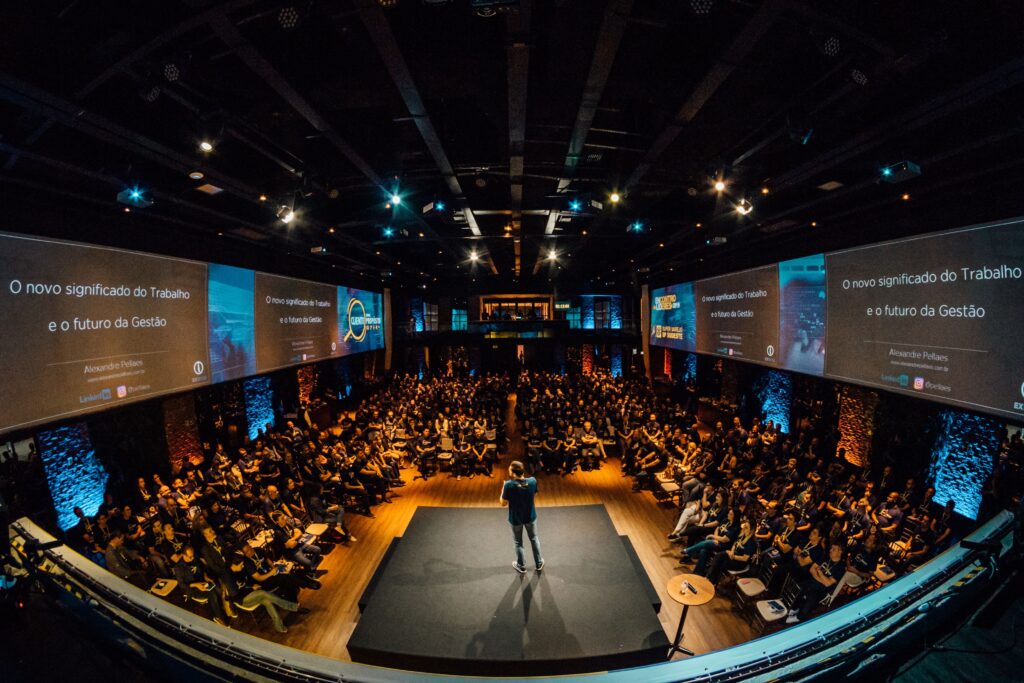
What is a Seminar?
Seminars are more intimate gatherings that often cover just one subject. In most seminars, a group of subject-matter experts moderate a discussion on the subject while providing a chance for audience participation and questions. For example – Real Estate, Artificial Intelligence etc.
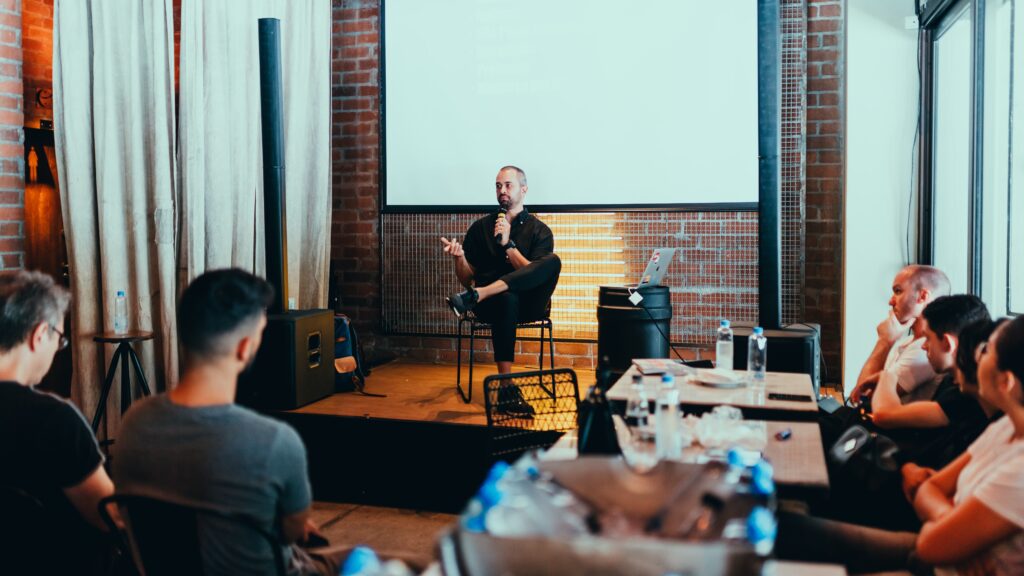
What is a Workshop?
A workshop is a practical educational session where participants learn new skills or methods. They are usually guided by an expert who illustrates how to perform something, after which participants get to try out the new abilities or methods for themselves. For example- Fashion Photography Workshops , Travel , Landscape, Nature Photography Workshops, Scientific Workshops , etc.

Conference vs Seminar vs Workshop: Why & When to Use?
- Seminars are held to raise awareness and provide a forum for information sharing. The topics covered at seminars might be industry-specific or they can be geared towards assisting participants in bettering their personal or professional life.
- While workshops are held where individuals may gain practical knowledge, they have a subject-matter expert addressing the crowd. You might hold a workshop to clarify your ideas if you are an expert in an area and want to impart your expertise.
- Contrarily, a conference is a discussion among a group of individuals on a topic that may or may not need problem-solving. You must organize or participate in a conference if you work for or are the leader of a company that needs to have a conversation to resolve a problem or discover a method to expand by considering fresh ideas.
Thus, you may distinguish between different aspects of a workshop, seminar, and conference based on your position and goals.
Conference Vs Seminar Vs Workshop: Decision Table
Conference vs Seminar vs Workshop: What’s the Difference?
Seminars are structured more like a speech or learning approach in a classroom. In this method, the lecturer, faculty, or educator delivers a speech or contributes to knowledge with a large group of individuals, like how an instructor addresses a classroom full of students.
Workshop involves hands-on exercises. For example- The teacher may discuss a learning concept in a workshop. To effectively explain the idea, the coordinator may collect participants into small groups to participate in exercises, pretend, and other hands-on tasks to apply what the attendees learned during the workshop’s address portion.
Conferences frequently feature a variety of speeches by well-known speakers, as well as individual sessions where academics show their concepts and data visually.
Additionally, several sessions are running concurrently. This implies that participants must select the sessions they wish to attend.
Seminars serve the purpose of bringing together small groups for periodic sessions, each time focused on a different subject, in which everyone present is expected to engage actively. The Instructor prepares visual materials, interactive tools or equipment, and demonstrations to present and discuss the topics.
Workshop s provide a strong emphasis on “hands-on practice” or laboratory work. The lab activity is intended to reinforce, imprint, and bring forward an immediate functional dimension. This is enabled by applying and executing the fundamental concept or method. It is presented throughout the lecture and demonstration process with specific practical applications.
A conference is a predefined type of assembly where the participants consult and talk on a range of subjects.
3 . Tone & Communicatio n
Seminars are semi-formal and frequently feature a one-way communication flow.
Workshops are more interactive than the others since both tutors and learners communicate.
Conferences operate in a consultative fashion with a two-way communication road. All participants are obligated to offer their opinions on the particular topic, and a resolution is established towards the end.
4 . Role of Speaker
The variety of seminar topics often enables the session facilitator to address a particular audience, such as a professional association or industry.
A workshop is where you may interact personally with your teacher, ask questions, work together and have a more exclusive experience.
A conference offers the chance to learn more about your professional course through various keynote speakers, networking opportunities, and conferences.
5. Benefits
Seminars are often conversational and led by one or two subject-matter experts. The pricing varies due to its scale and operation. It is advised if you want to deepen your understanding of a certain subject because it tends to be more academic in character then you should focus on lectures and research.
Workshops are typically less expensive and give participants practical skills they may apply in their careers. A workshop is an excellent option if you’re looking for a chance to learn new skills and meet new people.
Attending conferences may be quite expensive, and the rewards are sometimes inconsistent. However, a conference is the one to go to if you’re seeking chances to network or hear from business leaders.
6 . Type of Activity
A seminar setting could only include the main topic; there might not be any follow-up activities or classes for the attendees to put the knowledge they have learned in class to use.
Participants can choose from a wide variety of exercises, courses, and activities in the workshops .
All members should actively participate and contribute during conferences . It includes communicative activities such as debates and declamations.

7 . Participation of Audience
Seminars often has substantially larger crowds on the premises. It consists mainly of a specialist educating a group of participants on a certain topic.
Due to the hands-on activities that are a part of the workshop experience, workshops frequently feature smaller crowds of individuals or are divided into fewer groups.
The magnitude of conferences is considerably large. They frequently occur in big conference halls or auditoriums and attract hundreds or even thousands of attendees.
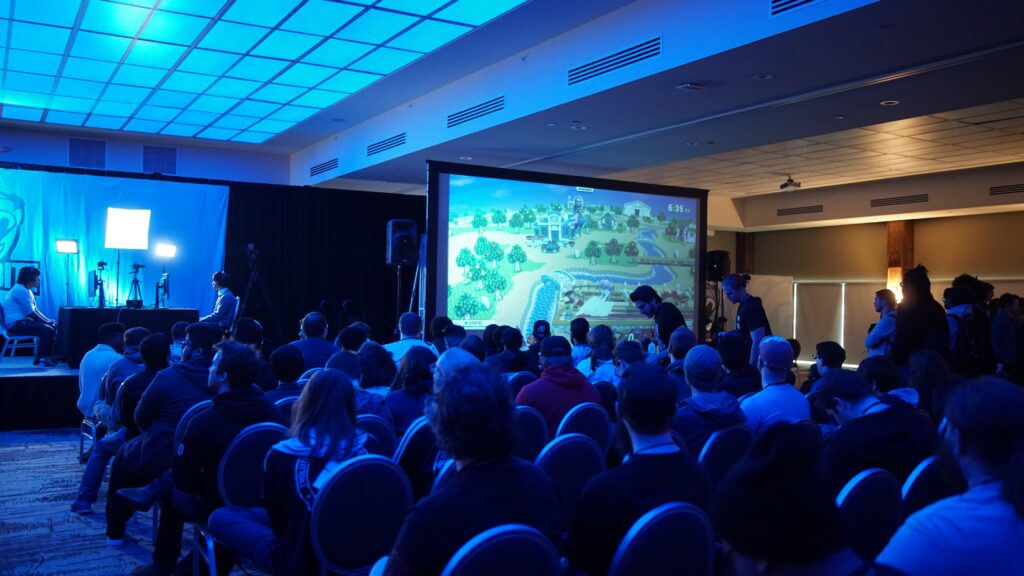
8 . Duration
Seminars are usually brief. They usually last an hour and a half to three hours.
Workshops are often longer than seminars. They usually last for several days or less, depending on the requirement.
A conference is more extensive than both- seminars and workshops. It comprises a thorough examination of the issue under discussion. Because of the prolonged length, participants are supplied with lodging.
Pros and Cons of Professional Events
1. seminars.
- The instructor can teach modules that build on one another.
- The consolidated block of time aids in focusing users’ attention on the seminar topic.
- Leading a group (e.g., a class or a lab group) contributes to developing a peer support network.
- Users get the knowledge that they may quickly apply to real-world information challenges.
- It is difficult to prevent scheduling conflicts.
- It takes much effort to prepare and deliver
2. Workshops
- Attendees are often very motivated
- Workshops might vary in duration and frequency of sessions.
- Can provide a series of workshops that build on each other
- Participants may have a distinguished understanding of the technical jargon of the subject matter.
- It may be difficult to accommodate all you wish to cover into a single workshop.
- Management of big classes for hands-on practice can be challenging.
3. Conferences
- The conference promotes the interchange of ideas and viewpoints.
- It fosters communication and networking by incorporating a large number of people from separate organizations.
- Participants gain vital knowledge and learn about other people’s points of view. This broadens delegates’ perspectives on organizational requirements and difficulties.
- The conference contributes to the goodwill of the participating organizations. It also contributes to the prestige of the organization hosting the conference.
- If the conference convener is incompetent, or the delegates are uncooperative, confusion ensues, and the entire exercise is rendered ineffective.
- The conference’s core aim is frequently defeated when a small number of attendees control the whole conversation.
- A conference frequently turns into a pointless activity as it can only offer recommendations. Rarely are any of these proposals followed up with actual action.
Key Takeaway
This blog post should have made the differences between conferences, seminars, and workshops more clear. Additionally, we hope that our blog post will assist you in deciding which option is best for you. All these three communication channels are crucial for the learning process. Seminars enable idea sharing. Workshops allow the dissemination of knowledge from an expert to others who are eager to learn. A conference is a free forum where knowledgeable experts can come to an agreement on how to conduct business best. In their respective fields of employment, all three are equally crucial.
And for more clarity, don’t forget to check out Eventible , where we track the largest group of professionals searching for the finest events (be it conferences, seminars or workshops) to attend and provide more information about various professional events. We bring in the efforts from organizers and sponsors together with feedback from event attendees, in order to bring transparency and closeness between expectations and results through our platform.

Conference Feedback: Why Is It Important & How To Collect It?

Conference Marketing: A Comprehensive Guide To Making Your Event A Success
Related posts, top 5 finance events for q2 (april to june) 2024, in conversation with hugh forrest, co-president & chief programming officer at sxsw, top 5 it events for q2 (april to june) 2024.
Comments are closed.
Alison Bensch
Senior director of global events, cloudinary, proudest of.
In both cases, we had to figure out how to take what are historically in-person events and translate them into engaging virtual experiences with a team of just two in-house event marketers, counting myself.
ImageCon is our flagship customer summit. In 2021, more than 1,700 people across 107 countries registered for the two-day event, which included 20 virtual sessions designed to help retailers unleash the full potential of their visual media.
Our hosted event series included about 8 virtual events across North America and EMEA markets. To drive up attendance and engagement, we hosted unique virtual cooking and mixology classes, wine tastings, tequila pairings, and more, with celebrity chefs and bartenders such as Marcus Samuelsson, Julio Cabrero, and Amanda Freitag.
Rockstar Mode
ImageCon was a success, in part, because we secured high-quality speakers and focused on providing true value to attendees by creating sessions to optimize their usage of the Cloudinary platform to improve their business. We featured customers in the content by doing customer spotlights. We also improved the production level of the summit by partnering with an agency.
I am proud we were able to pull off a high-quality event of this scale while managing 30 other events for the year.
Prior to the pandemic, our hosted event series consisted of in-person dinners and intimate happy hours. We wanted to recreate these virtually, without making them feel like webinars. We succeeded, in part, because we invested in high-quality talent to attract participants and create fun, memorable moments we probably could not have pulled off in-person.
We also took pains to make the events as easy as possible to attend, for example, by mailing guests meal kits or drink kits with everything they needed to participate. Of course, everything was branded, right down to the salt and pepper. We know our attendees’ time is precious, so we encouraged them to involve their family and were sure to include enough food and/or drink to share.
After the experience, we broke out into small groups, allowing people to network with peers and Cloudinary team members, who led discussions on relevant industry topics. Thus, attendees topped off a great culinary or cocktail experience with valuable learnings that could help their business. In fact, I see us continuing with some of these virtual events even after we have resumed in-person ones.
Our on-demand event content is now a powerful sales enablement tool for our sales team, who share session recordings with prospective customers, as well as existing ones who are considering adding on a new capability. We will continue to measure the performance of this content.
For the hosted events, we evaluate success by measuring pipeline acceleration. So, we consider where event guests are in their consideration process before attending the event. We use the event, and event follow-up, to help move the prospect or customer to the finish line. We usually see prospects who engaged in marketing campaigns were more likely to close, and close faster, than those who did not attend an event.
While this is harder to measure, we know our event series keeps the Cloudinary brand top of mind and deepens our relationship with customers. We document the positive feedback we receive from attendees and sales reps for internal use and marketing purposes.
Survivor Mode
Another challenge was creating an event strategy against a backdrop of so much uncertainty. I have seen industry colleagues invest resources in planning in-person events, only to have to rejigger in the final hour. I made the decision from the onset of the year to plan for virtual events, given our small team and resources. This allowed us to create more effective and engaging virtual events from the start and maximize our budget.
Nothing beats in-person events, and I am excited to be moving forward with these in 2022. But I plan to continue with digital and hybrid events, as well, for a number of reasons. When done right, they can be more memorable than in-person ones, and certainly more convenient. They also allow me to engage people across a wider geographic region (all of Europe for example or across the US), which leads to cost-savings and unique and widened interactions for our attendees.
Annie Yuzzi VP
Global corporate events and experiences, sumo logic, bethany roskin murphy, director of global events, drift, charlene kate ditch, founder, charlene kate events, gabrielle d., global events director, automation anywhere, gerilynn marburger, director, global events, hewlett packard enterprise, hollie ashby, senior manager, cxo and third party events, palo alto networks, lindsey cohen, director- event marketing, snyk, ceo & chief event strategist, liz king events, nicola kastner, vice president, global head of event strategy, sap, rachel russell, field marketing manager, even, samantha calle, associate director, xandr, margaret shaeffer, head of field marketing & events, linearb, traci depuy, head of global events, salesforce, dale rickert, global conference head of greentech festival, matthew lin, head of marketing, beetc, emilie watrob, head of event marketing, zs, katherine leong, director, corporate events, gainsight, sr. director, marketing technology (brand and events), salesforce, karim youssef, creative director, dpw, elizabeth thomas, head of global events, elastic, gerry schneider, vp events at wearedevelopers, director, global events at hewlett packard enterprise, mike kalyan, event and seminar marketing manager, shrm.

LOVE EVENTIBLE?
Disclaimer: If you choose to provide us with your email address or any other personally identifiable information, we will use it only to send you our newsletter or respond to your query.

Seminar vs Workshop: How to Tell The Difference

There are several different types of events you can host to provide your guests with important information and knowledge. Depending on the goals you have for your event , one type of event may work better than the other. Both seminars and workshops are educational for the attendees, but they do have a few differences! Let’s do a comparison of seminars vs workshops.
What is a seminar?
A seminar is a smaller event that is focused on a single topic. According to a Global Meetings & Events Forecast , 21% of event professionals believed small and simple meetings would be the most common types of meetings in 2021. Seminars usually have a panel of industry experts who will educate the attendees on the topic at hand. At the end of the seminar, the guests will have an opportunity to ask questions and engage with both the panelists and other guests.

What is a workshop?
A workshop is a hands-on learning experience for your attendees. They are able to learn new skills and then practice those skills in real-time. According to a collection of statistics from Visme , 65% of consumers say they better understand a product or service from live events. If your guests have any questions about the new skills they have learned, they are able to ask the workshop instructor immediately. These skills that the guests learn can be based on a new product or service, and everyone attending the workshop will all have the same training, so there will be no confusion or miscommunication.
Seminars vs workshops: how they’re alike
Seminars and workshops have a few similarities! While they differ slightly in a few areas, there are some similarities between the two events:
While the formal definition of a seminar and a workshop is different, both types of events are opportunities for learning and education. Both seminars and workshops are typically based around guests who work in skill-based professions. The education and the learning never stops and your guests even have the opportunity to earn a certificate ! The training and education that happens within the seminars and workshops can certify your guests in the field you are educating them in.
As discussed above, seminars and workshops are for training and educating your guests on the topic at hand. Both seminars and workshops can have a certain topic that the speakers are going to cover, and your guests are likely to attend because they have a genuine interest in the topic. The topic for seminars and workshops can change every time there is a demand for it, so you may have a new audience for each type of event every time.

Both seminars and workshops are relatively informal, with guests being encouraged to ask questions and engage with everyone. For example, conferences are formal and the guests don’t have an opportunity to engage with their guest speakers . Seminars and workshops are focused on the attendees learning and asking questions to the industry experts hosting the events . Your guests may have all different types of questions, so the hosts should take as many questions as time allows.
Seminars and workshops are both events that can be done in just one day. Seminars usually last an hour or two, with the speakers presenting their information, followed by a Q&A session at the end. Workshops can also be done in one day, but they might run a little longer than a seminar. Workshops can be used to explain how to use a new product or a service, so it might take some time to give an overview on how the guests can use the product correctly.
The formats of seminars and workshops can be done in a presentation or demonstration style, which is the best way to teach and present information and knowledge to your guests. As we have seen over the past few years, both seminars and workshops are able to be held either in-person or online!
Seminars and workshops are usually on the smaller side of events. There can be any number of guests attending your events, but the smaller, the better! This allows guests to fully grasp the information being presented, and it allows for every question the guests have to be addressed. In terms of workshops, the presenters of the new product or service can take the time to thoroughly explain the product or service, ensuring that the guests fully understand what they’re learning. If you have a larger group during your event, not everyone will grasp the topic at hand and they may fall through the cracks. For event planners that use KPIs for event success, attendee satisfaction is an important factor.

Seminars vs workshops: how they’re different
| Basis For Comparison | Seminar | Workshop |
|---|---|---|
| Smaller event, specific topic, panel of experts, topic can be tailored to audience’s needs | Interactive, facilitators present, learning new skills, hands-on learning, educational | |
| Specific topic, geared towards audience | New product or service introduction, hands-on training | |
| Semi-formal, guests listening to panelists followed by Q&A session | Informal, guests able to engage and interact with both workshop hosts and other guests | |
| Conducted in one day, a few hours, no need for more than one day | Usually conducted in one day, if you have multiple trainings/products, do multiple days | |
| Panel discussions and presentations | Testing new products and services, informal activities | |
| 10-50 guests, held in a seminar room with tables and chairs | Can host many people, just make sure each person has a chance to ask questions if they have them |
Master the art of seminars and workshops
Seminars and workshops are similar in the way that they present their guests with knowledge and information. Workshops are more of a hands-on experience, rather than an information presentation like a seminar. Both types of events are geared towards the education of the guests, just in different ways! If you want your guests to have a more hands-on approach to learning about a new product or service, then you can host a workshop. All of your guests can have the same training at the same time, and the workshop can even be recorded to use as a reference tool in the future.
Seminars can also be recorded and shared with any guest who registered but couldn’t attend. Whichever type of event you choose, you can be sure your guests will leave the seminar or workshop full of the knowledge you have developed for them. Planning to host a virtual seminar or a workshop? Hubilo will ensure that your attendees have a fine experience and want to return to the next event by hosting engaging and informative seminars and workshops. Reach out to us to book a demo!

Maximize performance with Hubilo's Webinar+

Related posts
Webinars vs. seminars: are webinars going to steal the show.
There are many benefits to hosting events like webinars and seminars. If you’re not sure which event to host, we can help! We’ll go through all the differences between the two.
How to Plan A Workshop Event?
Give people the chance to learn a new skill or new information by hosting a workshop! We’ll cover the top tips and tricks to organize a workshop that’s informative and fun for everyone.
10 High Impact Workshop Event Ideas
Workshops are a great way to learn new skills and meet new connections. If you’re thinking about hosting a workshop event, read on to learn 10 workshop ideas!
Hubilo is the webinar platform built for marketers that helps you 2X your pipeline. Founded in 2015, Hubilo's powerful engagement features, dedicated client experience team, and custom branding tools have helped create over 12K virtual events & webinars, creating hundreds of millions of minutes of high-engagement experiences and counting. Headquartered in Bengaluru and San Francisco, Hubilo's 200+ employees are dedicated to enabling webinars & virtual events that convert.
Stay connected with us.

Discover how Hubilo's Webinar+ can help you 2X your pipeline
Who are you

- Skip to primary navigation
- Skip to main content
- Skip to primary sidebar
- Skip to footer

Stay Informed Group
Stay informed with opportunities online
Seminar vs Workshop: Difference and Comparison
August 31, 2023 by Chukwuemeka Gabriel Leave a Comment
What is the difference between seminar and workshop (seminar vs workshop)?
The English dictionary defines a seminar as a class held for advanced studies in which students meet regularly to discuss original research, under the guidance of a professor. A workshop on the other hand is described as a brief intensive course of education for a small group, emphasizes interaction and practical problem solving.
Seminars and workshops are designed for attendees to learn new information. However, there are a few differences between them, which include the primary purpose or goal, format, and the interaction between instructor and students.
In a moment, we will be discussing the key difference between seminar vs workshop, as well as their definitions.
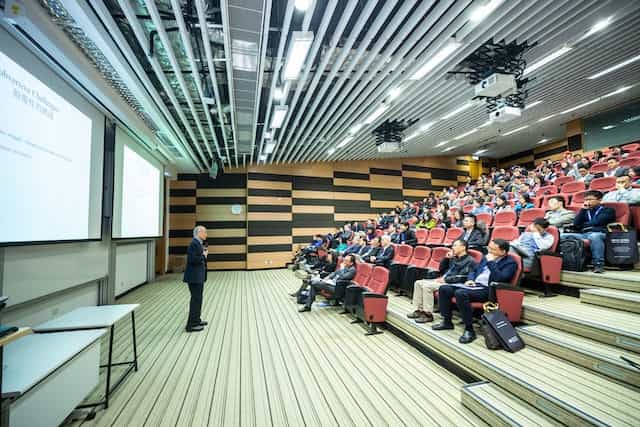
What Is a Seminar?
A seminar is a class held for advanced studies where students meet to discuss original research, under the guidance of a professor. It has a structure that is very similar to a lecture or classroom style of learning.
Seminars are lecture-oriented and they offer the same content to attendees just as a workshop does. Generally, seminars are held in a classroom environment, with the instructor educating attendees using audio-visual to make their presentations.
At the end of a seminar, attendees will be given an opportunity to ask the guest questions. There is also an interaction with other guests and panellists at the end of the seminar. They will engage in conversation based on the topic of the seminar and share their common opinion.
Also Read: Essential Oils vs Carrier Oils: Differences and Comparison
What Is a Workshop?
Unlike seminars, workshops are more interactive, and hands-on, and involve a smaller group of people. Workshops are designed to develop a specific skill.
In a workshop, participants are involved in a more active role and if need be, the facilitator will adapt to new plans in order to help the group progress.
The participants in a workshop are actively involved in practising whatever skill is being taught. The number of participants in a workshop is low compared to that of a seminar.
Since the number of participants is low, individual attention to participants is possible. In a workshop, more attention is given to imparting knowledge through practical mode than lectures.
Unlike seminars, workshops are usually held in places that are more spacious and not in a classroom environment. Learning in a spacious environment allows participants to have a clear view of the techniques demonstrated by the instructor.
Seminar vs Workshop: How They Are Alike
Seminars and workshops are designed for attendees to learn new information. Although they differ slightly in some areas, they have a few similarities.
The definition of a seminar and a workshop is different, but the primary purpose why they are held is to educate attendees on a particular topic and participants in a specific skill.
While seminars have a structure that is very similar to a lecture or classroom style of learning, workshops are mostly held at places that are spacious and open.
Seminars and workshops are both designed for guests who work in skilled professions. It is never too late to learn something new at any point.
Guests at seminars or workshops even have the opportunity to earn a certificate.
Also Read: 7 Up vs Sprite: Difference and Comparison
Seminars and workshops are designed to educate attendees and training participants in specific skills.
Seminars and workshops will have a topic that the speakers are going to cover. Guests will attend seminars or workshops because they are interested in the topic.
Topics for seminars and workshops will change when there is a demand for a new topic to be discussed. So, when a new topic is discussed in seminars or workshops, you will see a new audience in attendance.
Seminar vs Workshop: Comparison Chart
| Definition | A seminar is a class held for advanced studies where students meet to discuss original research, under the guidance of a professor. It has a structure that is very similar to a lecture or classroom style of learning. | In a workshop, participants are involved in a more active role and if need be, the facilitator will adapt to new plans in order to help the group progress. |
| Topic | About 10 to 15 guests present in a seminar room with tables and chairs. | Hands-on training, new products or services introduction. |
| Duration | Seminars are conducted in just a day within a few hours. | Workshops can also be conducted in one day. |
| Format | Panel discussions and presentations. | Testing new products and services, informal activities. |
| Size | About 10 t 15 guests present in a seminar room with tables and chairs. | Workshops can host more people than seminars. Everyone present should be allowed to ask questions. |
Also Read: Current Balance vs Available Credit: Differences and Comparison
Seminar vs Workshop: Difference between a Seminar and a Workshop
The following are some key differences between seminars and workshops.
- Both seminars and workshops are short-term training and education courses that people attend in an effort to acquire or enhance their skills.
- While seminars are lecture-oriented and best suited for over a hundred participants, workshops are mostly held at places that are spacious and open.
- In a workshop, personal interaction with the lecturer is common because of the small number of participants.
- However, in a seminar, attendees don’t get any personal attention from lecturers.
- Workshops are more of a demonstration of techniques by a qualified instructor.
- As a result of the small number of participants involved, personalized interaction with the instructor is possible.
- In a seminar, personalized interaction is not possible because of the large number of attendees.
- Workshops usually last for a longer period compared to a seminar. Workshops can last for one to two days.
- Seminars are conducted in one day, lasting for about 90 minutes to three hours.
- Seminars are held in a classroom environment with over a hundred participants attending.
- Workshops on the other hand purposefully choose to have smaller participants. About 25 participants or less attend workshops.
- In a seminar, questions are asked at the end of the presentation, while in a workshop, questions get attention as they are asked.
- There is no need to wait till the end of the workshop before questions are asked.
Seminar vs Workshop
Goals and objectives.
In a seminar, the main goal is to educate participants on a specific topic. The aim of organizing seminars is to raise awareness or share the latest research findings.
Workshops on the other hand are designed for participants who are interested to learn and develop new skills. The number of participants is usually small to enable personalized interaction with the lecturers.
Structure and Format
Another key difference between a seminar and a workshop is the structure and format. In a seminar, it’s usually one or more speakers delivering a talk to the audience.
The participants listen to the topic discussed and at the end of the presentation, they can ask questions.
In a workshop, participants are involved in a more active role and if need be, the facilitator will adapt to new plans in order to help the group progress. Here, you have the facilitator introducing the concepts and then participants are directed to practice what they have learned through exercise or group tasks.
Recommendations
- Meter vs Yard: Difference and Comparison
- Withdraw vs Withdrawal: Difference and Comparison
- TSP vs TBSP: Difference and Comparison
- Bussing vs Busing: Difference and Comparison
- Pint vs Quart: Difference and Comparison
- Differencesbetween : Difference Between Seminar and Workshop
- Hubilo : Seminar vs Workshop: How to Tell The Difference
- Practicaladultinsight : What Are the Differences between Seminars and Workshops?
- Iferp : Major difference between seminar and workshop
About Chukwuemeka Gabriel
Gabriel Chukwuemeka is a graduate of Physics; he loves Geography and has in-depth knowledge of Astrophysics. Gabriel is an ardent writer who writes for Stay Informed Group and enjoys looking at the world map when he is not writing.
Reader Interactions
Leave a reply cancel reply.
Your email address will not be published. Required fields are marked *
Save my name, email, and website in this browser for the next time I comment.
What Are The 12 Ivy League Schools in 2024?
Examples of praying scripture for students, 21 top dental schools for international students 2024, negative effects of technology you should know, do scholarships count as income, 39 best law schools in uk and ranking, woods vs. forest: what is the difference, top 10 marketable careers in the world in 2024, what are the best architecture schools in the us, 15 best psychology schools in the world 2024, what are the best exercise science schools, 10 best medical schools in mexico in 2024, student loan forgiveness: how to obtain a student loan forgiveness, what are the 14 punctuation marks for effective english writing, top rated universities in canada with the highest acceptance rate, reasons why is education important all you need to know, most important languages to learn for more opportunities, top tips for first-year students, 10 tips to choosing an online college, 100 positive affirmations for students, what is the difference between going green and sustainability, how many nickels make a dollar all you need to know, highest paid military in the world in 2024 (top 10 countries), how to record a meeting on microsoft teams, 5 universities in cambridge massachusetts ma, 25 cheapest universities in usa for international students, why you should get your master’s in counselling, 32 best work from home companies that are legit, 15 google meet ideas for teachers, 25 short term courses with high salary, career opportunities for bcom students, how to become a pilot with or without a degree, how to become a home inspector, is a master’s in information technology worth it, how to build a career in digital marketing, is an online associate degree in health science for you, how to become a video game designer, what is a business lawyer, how to capitalize job titles, project management methodologies: definition, types and examples, career development plan: how to create a career plan, what does a film producer do, how to become a medical writer, how to become a music producer without school, 20 high paying part time jobs.
30+ years in business.
(523 reviews).
- February 26, 2024
Seminar vs Workshop: What is the difference?
Table of contents.
Posted April 24, 2018 These days, businesses have more options than ever when it comes to employee training. That wealth of choices means organizations can find just the right training paradigm for their needs, but it can be frustratingly difficult to figure out which option is the right one. Even just choosing between the two mainstays of corporate training – workshops and seminars – can be confusing. To be clear, every option has its place, depending on the subject matter and goals of the course. Both workshops and seminars offer training designed for participants to enhance their skills. From there, however, they are very different creatures; and when it comes to developing writing skills , workshops stand out. Here’s why.
Writing workshops are interactive.
Seminars focus on one-way communication. The trainer or educator stands up in front of a group and presents a lecture or presentation on the topic at hand. Seminars can be wonderfully entertaining if done well, but audience participation is typically limited to questions at the end of the session. By contrast, workshops are highly interactive between participants and the facilitators. They tend to be activity-oriented and offer hands-on experience, including discussions among participants, skills development activities, and technique demonstrations. Participants can ask questions at any point; in fact, to some degree, participants influence the content of the workshop with their questions and comments – creating a more tailored experience.
Writing workshops are smaller.
Workshops are interactive only because they are smaller. Seminars, by contrast, might host hundreds or thousands of participants. Since seminars are one-way communications, they scale nicely, and a single trainer can engage with a huge number of people simultaneously. Participants do not, however, receive individualized attention and, with particularly large seminars, questions can go unaddressed entirely. Workshops can be sizeable, but in those cases, they usually break out into small groups to make it easier for facilitators to lavish more attention on each participant and their smaller group. This is particularly key when it comes to an activity like writing, which is an active skill that improves best when it comes with immediate, professional feedback and personalized instruction.
Writing workshops use participant writing samples.
It also helps when the workshop uses samples and examples specific to the audience. Seminars can sometimes do this, but workshops are the perfect venue to incorporate a company’s own writing into the lessons, so that the learning can be less abstracted and have more relevance to the participants’ specific needs. These are only a few of the great benefits of writing workshops. If you think your team needs to sharpen their writing skills, contact Hurley Write today!
Related Articles:
Elevate your career with expert presentation skills training, 5 engaging powerpoint presentation examples to wow your audience, becoming a better writer.
- Professional Writing: 8 Tips to Ensure Your Team’s Communication is Persuasive
Related Courses:
- Building Better PowerPoints and Visuals
- Effective Strategies for Writing with Artificial Intelligence (AI)
- Exceptional Technical Writing
- Technical Writing for Engineers
If you want to learn more, sign up to our newsletter.
- Proposal Writing
- Writing for Financial Professionals
if you want to learn more about insert article name here.
Rela ted blogs.
- August 13, 2024
- August 5, 2024
- July 8, 2024
Subscribe to our newsletter for new insights about writing.
- 1-877-249-7483
- [email protected]
Our Workshops
- For Individuals
- Communication Audits
Industries we Work With
- Pharma & Biotech
- Energy, Oil & Gas
- Finance & Accounting
- Engineering
- Manufacturing
- White Papers
- Workshop Catalog
why hurley write
- Meet Our Team
- Our Clients
- Case Studies
Contact Hurley Write, Inc.
What is a workshop and why should you run one?
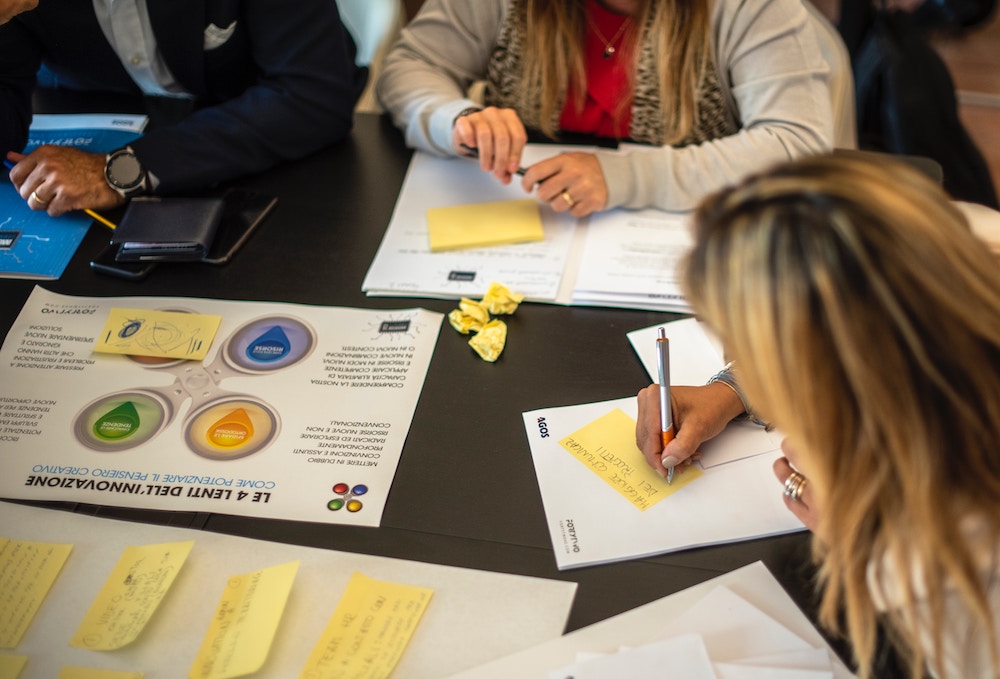
Workshops are more than just interactive meetings. They're a space for groups to come together around a shared goal, collaborate effectively and solve complex problems. If you're wondering what a workshop is, how they differ from training or meetings, or just want to start running them, you're in the right place!
A great workshop can create innovation, connection and transformation for both companies and individuals. In this article, we'll explore what workshops are, what benefits you can expect, and also show you some workshop examples that you can use for inspiration when working with your team.
Design your next session with SessionLab
Join the 150,000+ facilitators using SessionLab.
Recommended Articles
A step-by-step guide to planning a workshop, 54 great online tools for workshops and meetings, how to create an unforgettable training session in 8 simple steps.
- 18 Free Facilitation Resources We Think You’ll Love
What is a workshop?
A workshop is a structured and interactive session designed to create an environment for meaningful work and to guide a group through a process that will lead to great outcomes.
Workshops are designed to engage participants and foster their active involvement in the process. They are not training sessions where one person teaches everyone else in the room. Nor are they meetings where people give one another updates but rarely collaborate on a task with a structured approach.
Workshops typically involve hands-on activities, facilitation techniques , group discussions, simulations, and collaborative exercises , which allow participants to explore, ideate, and participate in achieving their desired outcomes. Whether that’s aligning on a perfect solution to a tricky problem or improving their skills experientially.
Workshops can cover almost any topic you can think of – whether it be a creative word workshop for school kids or a strategic planning session for company executives.
The key elements of these workshops are the same: they seek to create a dynamic environment that encourages participants to learn from each other, consider their own solutions, and apply the gained knowledge both inside the workshop and in the wider world.
Another aspect that unites all workshops is that they are structured and designed in order to help a group achieve a desired outcome. A workshop facilitator will often plan a workshop as a sequence of activities with careful attention to timing, flow and an optimal group dynamic. When it comes to actually designing your workshop agenda, SessionLab is a useful tool for designing a workshop flow while ensuring you stay on time!

What is the difference between a workshop and meeting?
What distinguishes workshops from meetings, seminars and training courses is an emphasis on active participation, experiential learning and collaborative work.
You could begin to think of a workshop as an interactive meeting, but they go much further than that. The objective of a workshop is to guide participants through a process where they ideate together, explore possible options and then figure out a plan of action.
Workshops are much more interactive than meetings or training sessions, and they often go through a process designed to enable a group to explore a subject collaboratively and arrive at solutions that are not pre-determined. The facilitator will use proven techniques and technology to support interactivity and engagement, but the outcomes of the session are a truly collaborative effort.
One key distinction for me is that workshops are often about exploring a problem space as a small group and then actively working together to find a solution. Think of how your organisation might do strategic planning. If the boss calls a meeting to tell the group your strategy, that’s a meeting. If the boss brings in a facilitator so that the group can explore options collaboratively and design a strategy together, that’s a workshop.
Another distinction I find helpful is when thinking of the difference between a workshop and a training session. In a training course, you know the outcome before you begin: you will teach your group how to achieve something in a pre-determined manner. They’ll often complete training materials in a pass/fail manner and be expected to come out of the course with a specific set of skills.
In a workshop, you may not know the exact outcome and it’s down to the group to collectively get there. Yes, you know that you want employees to explore creative ideas by going through a process designed to help them come up with ideas, but you don’t know what those ideas will be.
As a workshop facilitator , you leave space for the team to bring their professional expertise, their creativity and their unique perspective to the process.
In comparison to a meeting or training session, a group in a workshop is supported to discuss, explore and ideate together before arriving at outcomes in a process often designed and led by a facilitator. They are more actively involved in directing their learning experience and contribute to the experience of the entire workshop.
The result is a much more creative and collaborative environment that encourages ownership, participation and genuinely impactful outcomes.
What is the purpose of a workshop?
While the objectives or goal of a workshop can vary based on the setting or specific topic – a design sprint and a retrospective workshop have very different goals – but the purpose is roughly the same.
The purpose of a workshop is to create a space where participants can think together in a place of safety and mutual trust, engage in collaborative work and arrive at your outcomes in an organized and structured manner.
Whether it’s defining how to achieve a complex project, building skills or working on personal development, the purpose of the workshop is to create an interactive, participatory environment for people to engage fully, collaboratively and creatively and arrive at your chosen outcomes.
The purpose behind that purpose is what makes workshops a special and effective tool. When you create a safe space that empowers your team to find their own solutions, creativity is unleashed .
Your team finds solutions they wouldn’t have discovered otherwise, they build meaningful and lasting connections with other participants and they’re especially engaged and able to focus on making those things happen.
In my experience, a great workshop can be transformative for all involved, and the improvements in communication, collaboration and problem solving have far reaching effects beyond an individual session or project .
This is another way to answer the question, what is a workshop: it’s a means of helping team’s find more effective ways of working both collaboratively and individually in order to achieve their goals.
When should you run a workshop?
As we’ve explored, running a workshop can be one of the most effective ways to bring a group together to innovate, solve problems and connect.
This isn’t to say that every session you do should be a workshop. Far from it! There are times when a meeting is the right way to come together, such as doing a daily update or company all hands where people on your team have information to share.
In a university setting, a seminar where a lecturer shares knowledge in their particular field with a large group of students is often the most effective way to disseminate learning materials quickly.
In short, you want to consider running a workshop whenever you want a group of people to do collaborative work effectively, often in a time-boxed or outcome focused manner.
Workshops are great at delivering results in a way that creates space for many voices and perspectives and if you know your group would benefit from this approach, that’s a fine time to consider planning a workshop .
Some of the common triggers for running a workshop include:
- having a complex problem without a clear solution
- a need for genuine innovation and new ideas
- team building or team development
- teaching new skills in an experiential manner
- community building
- working on a project in a deeply collaborative and emergent way
- opening or closing a project
Another great tip for running a workshop is to use a relatively small group (often 8-15 people) in order to create space for discussion, divergent thinking and ideation. When running workshops with larger numbers, you’ll want to add additional facilitators and perhaps run sessions in parallel.
Wanting to simply teach your group how to use new technology or share information from the executive team with the rest of the company? That’s probably not a workshop, and that’s fine! Use the right format for the results you want to achieve and the objectives of your session.
Workshop examples
Workshops come in all shapes and sizes, but you might be wondering what they look like in practice and how they are put together. Especially if you’re new to facilitation, seeing an agenda example can help show the value of a workshop before you try running one yourself!
Below, we’ll explore a few example workshops and detail when and why you might run them with your team. You’ll also find an agenda template for each, so you can see the workshop process in more detail.
Ideation Workshop
Workshops are a perfect space for creating innovation and coming up with ideas that you can actually move towards implementing. When you have a complex problem without an obvious solution or many stakeholders and perspectives, gathering your best minds and bringing them to a workshop is an ideal way to move forward.
In this ideation workshop template , a team first generates a heap of new ideas around a particular topic and then works through a process of analysing and selecting the best ideas by pitching them to one another. By the end of the workshop, you and your group will have discussed ideas thoroughly and used tools to develop the best ones into something you could implement quickly.
Companies that encourage this kind of creative ideation and invest time in enabling their employees are often more resilient and innovative. Try bringing such a workshop to your company the next time you need a new perspective or looking for your next great idea.

Decision Making Workshop
Whatever your particular field, there comes a time when you need to make a decision as a team . A decision making workshop is a method of exploring various options, aligning on objectives and moving forward as a team. It’s a space for employees to discuss their thoughts, share how they feel and then converge on a final decision that is the best one for the company.
In this template , you’ll use consent based decision making to move from discussion to action and allow everyone from management to front-line employees to contribute. It’s an effective session for building a sense of community and making progress effectively.
If you’ve found that you’ve tried to include more people in your decision making processes and found it ineffective or messy, this workshop is a perfect antidote that creates space for all voices while also arriving at your intended outcome.
Retrospective
For complex projects that require innovative problem solving, workshops can be an essential part of both opening and closing the process. I’ve even found that groups working in university or training settings with an intensive educational program can benefit from using a workshop approach to closing the program.
In this retrospective template , you and your team will find space to reflect together and discuss what went well and what went better before choosing some actions everyone will take in the future to develop their skills and improve the next project.
After a week long event or a longer project, coming together in a retrospective workshop can both help you symbolically close and celebrate proceedings while also creating space for reflection and growth.
In conclusion
Understanding how a workshop differs from a meeting or training courses is often the first step towards bringing them into your organization.
For next steps, you can explore our step-by-step guide to planning a workshop to learn how to put an effective workshop together.
Want to improve your facilitation skills? This article will help you see the key skills for effective facilitation you can use in workshops, meetings and in your general practice when working with groups.
We hope this blog post has helped you understand the what and why of running a workshop and has perhaps inspired you to facilitate one the next time you need to solve problems or create innovation in your organization!
James Smart is Head of Content at SessionLab. He’s also a creative facilitator who has run workshops and designed courses for establishments like the National Centre for Writing, UK. He especially enjoys working with young people and empowering others in their creative practice.
Leave a Comment Cancel reply
Your email address will not be published. Required fields are marked *
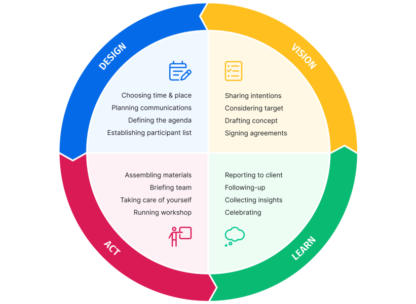
Going from a mere idea to a workshop that delivers results for your clients can feel like a daunting task. In this piece, we will shine a light on all the work behind the scenes and help you learn how to plan a workshop from start to finish. On a good day, facilitation can feel like effortless magic, but that is mostly the result of backstage work, foresight, and a lot of careful planning. Read on to learn a step-by-step approach to breaking the process of planning a workshop into small, manageable chunks. The flow starts with the first meeting with a client to define the purposes of a workshop.…

Effective online tools are a necessity for smooth and engaging virtual workshops and meetings. But how do you choose the right ones? Do you sometimes feel that the good old pen and paper or MS Office toolkit and email leaves you struggling to stay on top of managing and delivering your workshop? Fortunately, there are plenty of great workshop tools to make your life easier when you need to facilitate a meeting and lead workshops. In this post, we’ll share our favorite online tools you can use to make your life easier and run better workshops and meetings. In fact, there are plenty of free online workshop tools and meeting…
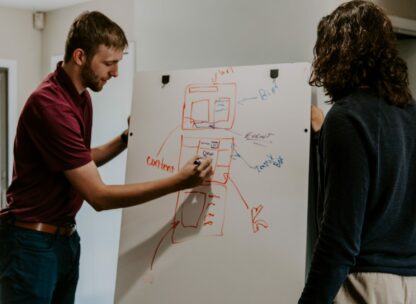
How does learning work? A clever 9-year-old once told me: “I know I am learning something new when I am surprised.” The science of adult learning tells us that, in order to learn new skills (which, unsurprisingly, is harder for adults to do than kids) grown-ups need to first get into a specific headspace. In a business, this approach is often employed in a training session where employees learn new skills or work on professional development. But how do you ensure your training is effective? In this guide, we'll explore how to create an effective training session plan and run engaging training sessions. As team leader, project manager, or consultant,…
Design your next workshop with SessionLab
Join the 150,000 facilitators using SessionLab
Sign up for free
Seminar vs. Workshop: What's the Difference?
Key Differences
Comparison chart, primary focus, participant role, interaction, content type, seminar and workshop definitions, how is a workshop typically structured, are workshops more hands-on than seminars, can seminars be interactive, are seminars more formal than workshops, can a seminar be conducted virtually, do i need specialized knowledge to attend a seminar, is attendance at seminars and workshops typically free, can a seminar evolve into a workshop, how does participant involvement differ between seminars and workshops, what types of skills are typically developed in workshops, are workshops typically longer than seminars, what is the primary aim of a seminar, how are outcomes evaluated in workshops, what materials are typically needed for seminars and workshops, can anyone host a workshop or seminar, how does the facilitator’s role differ in seminars and workshops, can workshops and seminars be part of a larger event, what is the expected attire for seminars and workshops, are workshops always subject-specific, how are seminars and workshops typically advertised.

Trending Comparisons

Popular Comparisons

New Comparisons

- Get the Job
- Resumes and CVs
- Applications
- Cover Letters
- Professional References
Professional Licenses and Exams
- Get a Promotion
- Negotiation
- Professional Ethics
- Professionalism
- Dealing with Coworkers
- Dealing with Bosses
Communication Skills
Managing the office, disabilities, harassment and discrimination, unemployment.
- Career Paths
- Compare Careers
- Switching Careers
- Training and Certifications
- Start a Company
- Internships and Apprenticeships
- Entry Level Jobs
- College Degrees
Growth Trends for Related Jobs
What is the difference between a workshop & a seminar.

What is a seminar ? What is a workshop? Are there significant distinctions or is it all just semantics? If you’ve been given the opportunity to participate in a workshop or to attend a seminar for work, good for you! Both can help boost your knowledge base and can be great networking opportunities. But before you sign up, or especially if you are tapped to be a speaker at a seminar or workshop, you’ll want to know what they’re all about, how they are the same and how they differ.
Workshops and Seminars: How They’re Alike
Although seminars and workshops can be offered as part of a larger conference, they can also be standalone events. If your business is real estate, you may attend regional or national conferences, in which experts present seminars and workshops. Additionally, either category can follow the conference's theme of the conference or it can be specific to the company or the presenter. And both workshops and seminars are intended to educate their audience on a specific topic or topics.
Workshops and Seminars Have Different Formats
Probably most notable among the differences is the format that workshops and seminars have. Even the most audience-aware speaker at a seminar only allows for so much engagement from its participants. Most likely, the speaker or panel members at a seminar will conduct a presentation, using some sort of slide deck. They’ll provide you will relevant information on a specific topic and then, they'll usually open up the discussion at the end of the formal presentation, to take questions from the attendees. Taking notes during a seminar is valuable for this Q&A session, so any questions that arose up during the talk will have been answered by the presenters. If the seminar has done its job, then notes also serve as an important tool that's valuable to the attendees long after the seminar has ended; this is when you can put the information you learned at the seminar to good use.
On the other hand, workshops, not only encourage engaging with other participants - they insist upon it. You may be asked to complete a workbook or to complete some pre-work before the workshop. Once at the workshop, you’ll be expected to be fully involved in the learning process. Likely, there will be activities and exercises in which you and your fellow participants practice what you’re learning during the workshop. For example, you may be given an example of an effective strategy and then you may be asked to come up with an effective strategy of your own. Or, you may be invited to role play, based on some of the principles you will learn. There may even be quizzes so that the workshop facilitator can ascertain whether or not you fully understand what is being taught. The end goal of a workshop is to provide you with hands-on learning that you can apply to a real-world setting.
Workshops and Seminars Differ in Length and Size
By their nature, workshops cannot be huge affairs with hundreds of attendees. They usually cap out the number of attendees at no more than a couple of dozen people. The most effective workshops give you an opportunity to have some one-on-one attention from the facilitator, and—sometimes even more valuable—a chance to learn from your peers. Conversely, the speaker at a seminar can impart his knowledge to an auditorium full of people. The largest practical business seminar record was set in 2017 by the Ministry of Education, Youth and Sports in Cambodia. There were 2,304 participants.
Another difference between seminars and workshops is how long they last. Expect a seminar to last a couple of hours. But when it comes to workshops, think in terms of days. Usually, workshops last from one to three days, whereas seminars last only as long as it takes for the presenter to get her message across.
Related Articles
How to create a workbook for a seminar →.

Presentation Activities for Seminars →


Types & Styles of Mentoring →

Hospitality Committee Duties →

Business Communication Protocol →

How to Write an Academic Conference Paper →

- SpeakerNet News: Seminars vs. Workshops
Linda Emma is a writer and private marketing coach and consultant. She also works at a small New England college as a tutor, assisting students with course-specific materials and preparation for internship and employment.
stokkete/iStock/Getty Images
- Job Descriptions
- Law Enforcement Job Descriptions
- Administrative Job Descriptions
- Healthcare Job Descriptions
- Sales Job Descriptions
- Fashion Job Descriptions
- Education Job Descriptions
- Salary Insights
- Journalism Salaries
- Healthcare Salaries
- Military Salaries
- Engineering Salaries
- Teaching Salaries
- Accessibility
- Privacy Notice
- Cookie Notice
- Copyright Policy
- Contact Us
- Find a Job
- Manage Preferences
- California Notice of Collection
- Terms of Use
Unnatural Consequences
These are mostly notes to self that I hope are useful to others
Talks, Lectures, and Workshops. What is the Difference?

I am about to go on a mini speaking tour and in preparation I am skimming Scott Berkun’s “Confession of a Public Speaker.” I like this book, but while reading it I realized that I will be giving two different types of “speeches”. Let’s call them talks and workshops, and even though in both cases the subject will be Stan , the audience’s expectations will be different and my presentation must reflect those differences. In particular, Scott’s book is a lot more relevant to talks than workshops.
Most inexperiences speakers assume that the people who come to their talks want to learn something and some people do have that expectation, but those are usually inexperienced consumers of talks. The truth is that it is very unlikely that you will learn something during a talk. Learning is a hard and active process and it is not going to happen by passively absorbing sound and light waves in a reclining position. The most realistic goals for a talk is to inspire people to learn more about the subject. This is a difficult task for the presenter, but if you want to know how to do it well, I highly recommend Scott’s book.
A workshop is a different animal. As the name suggests, the participants will be working alongside the presenters and in so doing are hoping to come away with enough initial knowledge to jump start their own exploration. People who attend the workshop have already been inspired to learn more and the bar is therefore higher than during a talk. So what are the important attributes of a good workshop?
To think about that, image you are taking a technical class at a University. You are listening to a lecture. Are you at a talk or at a workshop? The listening part gives it away. Most likely you are at an uninspiring talk that should instead be a workshop. In order for the workshop to go well, here is my short of list of requirements:
- Participants should have the required background at the right level of abstraction
- If this is a computing workshop, participants already installed and tested the required software
- Presenters have designed a series of exercises that gradually guide the audience through a set of hands on tasks each illuminating a different part of the subject
- Participants have a chance to discuss the problem and their solutions with each other and with the instructors
- There is a mechanism for the immediate feedback that tells the instructors if the majority have mastered the task
As a presenter, I can not control 1 and 2, but I must make it easy for people to assess their level of knowledge and software installation instructions must be clear.
Creating exercises is very time consuming, but I believe necessary for workshop style learning. Time for discussions can be weaved into the exercises and the output of the exercises can be shared with the rest of the class. Which brings me to the feedback mechanism, which is perhaps the most often overlooked aspect of the workshop.
I don’t have much experience with a feedback system during workshops, but I have used live surveys during talks and they work really well. For computing workshops, I would like to experiment with live code editors, where participants have a chance to post their code, their questions, and the error messages to the shared workspace. This would only work for moderate size groups, but I it seems to me that workshops should only be conducted in relatively small groups (say 50 people or fewer).
If you have any pointers on how to make the workshop experience better, feel free to post them in the comments.
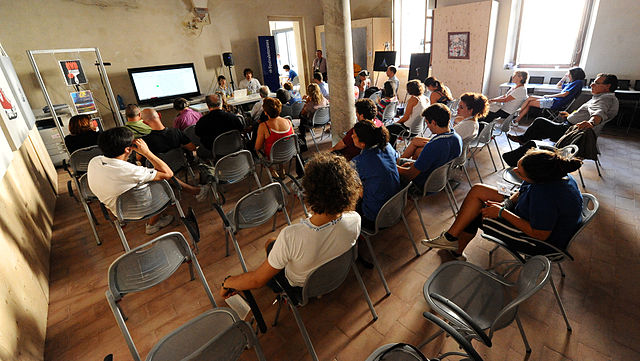
Distinguishing Between Seminars & Workshops
Seminar vs Workshop
Seminars and workshops are both educational opportunities, and the differences between them do not make one superior to the other. Both types of events are valuable for individuals involved in skill-based professions, as they provide up-to-date knowledge and insights into emerging trends. However, there are fundamental differences in the style and methodology of these two types of courses, which this article will help to clarify.
There are many professions where individuals feel the need to update their skills, as new methods and techniques are constantly being developed. Attending short-term training courses, such as seminars and workshops, can help enhance these skills and learn new techniques, without the cost and time commitment required for full-time courses.
What is a Seminar?
A seminar is generally lecture-oriented and delivers similar content to a workshop. However, audience involvement and interaction are more limited or less extensive than in a workshop. Seminars are better suited for larger groups of participants, often over one hundred. Engaging sessions can still be achieved in seminars, depending on the teacher’s abilities. Seminars usually take place in classroom environments and often incorporate audio-visual aids as part of the presentation.
What is a Workshop?
In a workshop, participants play a more active role, and sometimes personalized help and assistance are provided by the teacher. Individual attention is possible in a workshop because the number of participants is typically kept low. Lectures play a smaller part in workshops, with a greater emphasis on practical learning. Workshops are usually held in more open and spacious locations than seminars, allowing participants to clearly see the techniques being demonstrated by the teacher.
What is the difference between Seminar and Workshop?
• Seminars and workshops are short-term training courses designed to help working individuals improve their skills. • Seminars are lecture-oriented and better suited for larger groups. Personalized attention is not possible in seminars, although engaging sessions can still be achieved through the teacher’s skills. • Workshops involve more demonstrations by the instructor and have fewer participants. • Workshops are more interactive. Personal interaction with the lecturer is possible due to the smaller number of participants, which is not possible in seminars. • Workshops tend to be longer, often lasting one or two days or more, while seminars usually range from 90 minutes to three hours, although day-long seminars also exist. • Seminars often have more than one hundred participants, while workshops purposefully have fewer, usually 25 or less. • Questions are addressed at the end of presentations in seminars, but in workshops, questions are answered as they arise.
Key Takeaways
- Seminars are lecture-oriented and better suited for larger groups, while workshops are more interactive and have fewer participants.
- Individual attention is possible in workshops due to the smaller number of participants, whereas this is not possible in seminars.
- Workshops tend to be longer and more focused on practical learning, while seminars usually have a shorter duration and rely more on lectures.
LEAVE A REPLY Cancel reply
Save my name, email, and website in this browser for the next time I comment.
Related Articles
Difference between power & authority, distinguishing could of & could have, distinguishing pixie & bob haircuts, distinguishing between debate & discussion, distinguishing between dialogue & conversation, distinguishing between a present & a gift, distinguishing between will & can, distinguishing between up & upon.
What is the difference between conference seminar and workshop?
There are many types of professional development events that educators can attend, but it can be confusing to understand the difference between them. Conference, seminar, and workshop are all terms that are often used interchangeably, but they actually have different meanings.
So, what is the difference between a conference, seminar, and workshop?
Conference:.
A conference is a large gathering of people who come together to discuss a specific topic or theme. Conferences usually have a few keynote speakers who are experts in the field and who deliver speeches to the attendees. There are also usually breakout sessions at conferences where attendees can choose to participate in smaller, more intimate discussions on specific topics.
A seminar is a smaller event than a conference, and it is typically focused on a single topic. Seminars typically involve a panel of experts who lead a discussion on the topic, and attendees have the opportunity to ask questions and participate in the discussion.
A workshop is a hands-on learning experience where attendees learn new skills or techniques. Workshops are typically led by an expert who demonstrates how to do something, and then attendees have the opportunity to practice the new skills or techniques themselves.
Read: Conference associated with Scopus index journals
Difference between workshop and conference
Conferences can be very expensive to attend, and the benefits are not always clear. However, workshops are generally more affordable and provide attendees with tangible skills that they can take away and use in their own work. When deciding whether to attend a conference or a workshop, it is important to consider what you hope to get out of the experience.
If you are looking for an opportunity to learn new skills and meet new people, a workshop is likely the better choice. If you are looking for networking opportunities and the chance to hear from industry leaders, a conference is probably a better fit.
Difference between conference and seminar
Conferences and seminars are two very important types of events that are often confused with one another. While they both serve the purpose of bringing people together to discuss a certain topic, there are actually quite a few differences between the two.
Here’s a look at the key differences between conferences and seminars:
1- Conferences are usually much larger in scale than seminars. They often involve hundreds or even thousands of people and are held in large convention halls or auditoriums.
2- Seminars, on the other hand, typically involve a smaller group of people – usually no more than 100. They may be held in smaller meeting rooms or even someone’s office.
3- Conferences also tend to be much more formal than seminars. The dress code is usually business casual or even business formal, and the atmosphere is generally quite professional.
4- Seminars, on the other hand, can be a bit more relaxed. The dress code is usually casual, and the atmosphere is more intimate and less formal. The format of a conference is also generally quite different from that of a seminar.
5- Conference sessions are typically much shorter – only 30 minutes to an hour – and there are multiple sessions going on at the same time. This means that attendees have to choose which sessions they want to go to.
Difference between seminar and workshop
The key difference is that seminars are typically led by one or two experts on the subject, while workshops are often led by facilitators who guide participants through the material. This can make seminars more passive in nature, while workshops are more interactive.
Seminars tend to be more academic in nature, focusing on lectures and discussion, while workshops are more hands-on, with a focus on skill-building and practice.
Seminars are usually organized around a specific topic, while workshops can be more general or tailored to a particular audience.
Seminars are typically shorter than workshops, lasting anywhere from a few hours to a few days, while workshops can last for days or even weeks.
If you’re looking for an international conference, With allconferencealert.com, you can search for conferences by location, date, and keyword.
Glossary of Meeting Terms
- Meeting Type
What is a Workshop?
A workshop is a long interactive meeting or educational session designed to create a specialized result. Workshops are longer than the typical business meeting and require more preparation beforehand. Workshops typically involve a central trainer or facilitator who works with a set of sponsors to design the sequence of presentations, plan collaborative activities, and ensure the workshop will lead to the desired result. Workshops emphasize hands-on interaction. Strategic planning often includes one or more planning workshops. Kickoffs, team chartering, requirements analysis, product design, value stream mapping, and other meetings with large collaborative deliverables may all be conducted as workshops.
- What is the difference between these four: conference, workshop, symposium and seminar? ~ on Quora
Related Templates
- How to Run a Value Stream Mapping Workshop
- « previous term
- next term »
Like this page? Share it!

Workshop vs Presentation - What's the difference?
As nouns the difference between workshop and presentation, as a verb workshop, derived terms, presentation, alternative forms.

Seminar vs. Workshop — What's the Difference?
Difference Between Seminar and Workshop
Table of contents, key differences, compare with definitions, common curiosities, what is the goal of a seminar, is a seminar interactive, what is a seminar, who typically conducts seminars, what types of skills can be developed in workshops, how are workshops different from seminars, what is the primary purpose of a workshop, are seminars suitable for skill development, what is a workshop, who leads workshops, share your discovery.

Author Spotlight
Popular Comparisons

Trending Comparisons

New Comparisons

Trending Terms


What is the Difference Between Workshops, Conferences, and Seminars?
May 26, 2022 | Events
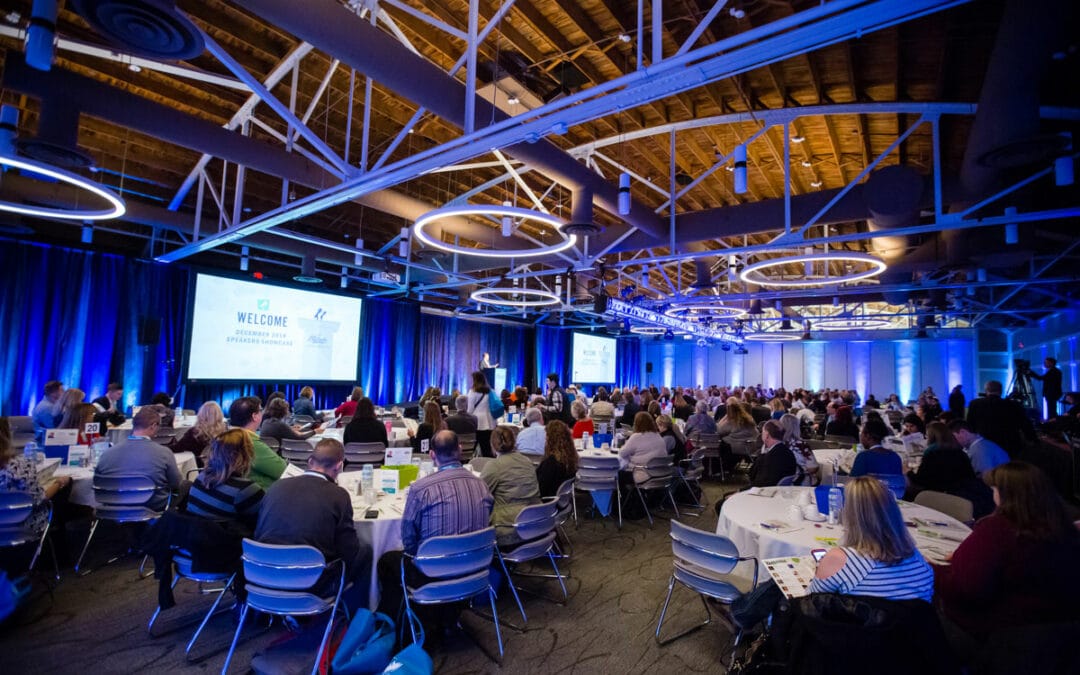
What Is The Difference Between “Workshop” and “Conference”
In this blog, we’ll break down the differences between the most common types of corporate events , from seminars and conferences to workshops and symposiums. You’ll learn about the size, duration, goals and other details of each event, plus see examples of each.
What is a Conference?
What is a workshop, what is a seminar, what is a symposium.
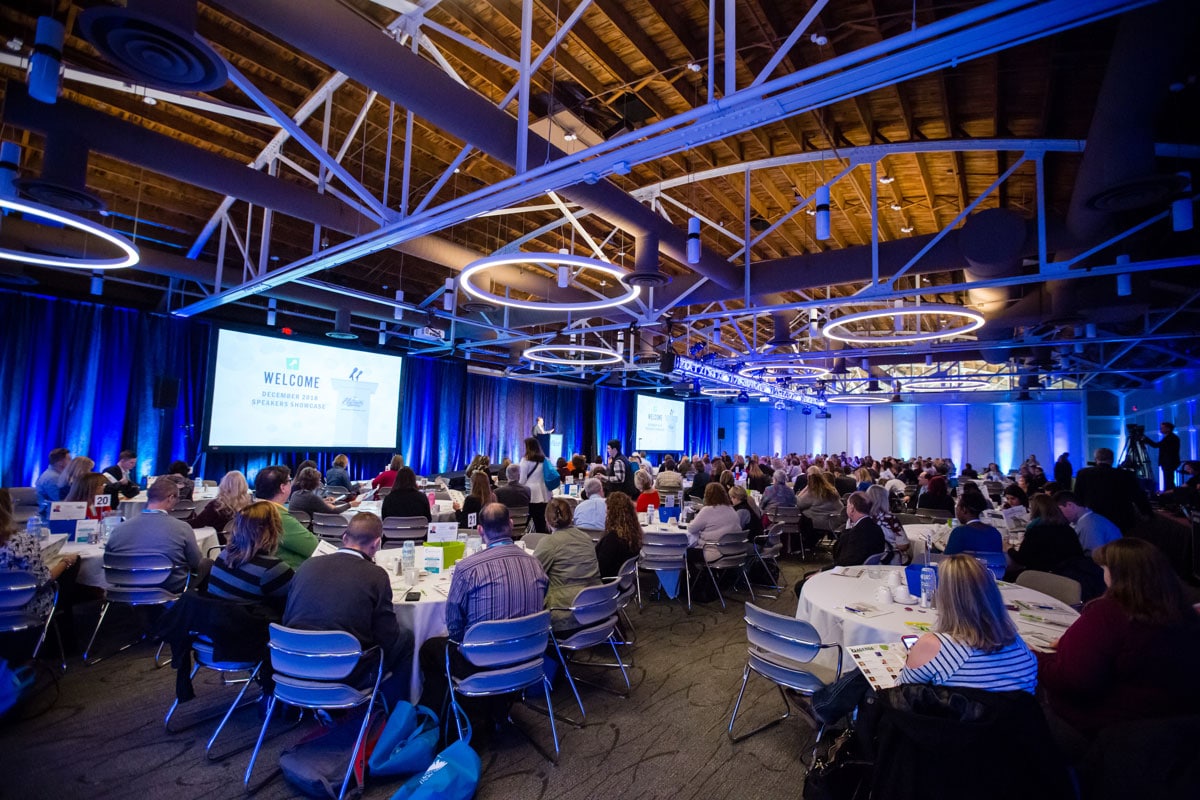
A conference is a large, formal meeting of people with shared interests, usually involving presentations, exhibitions, featured speakers , problem-solving sessions, and consultation sessions. Conferences are often used to bring together people who work within the same or similar industries, to connect buyers and sellers of certain types of products or services, or to network around a particular idea or theme. A conference theme will usually be broader than the topic of a workshop, which tends to focus on a more specific and hands-on topic.
Conferences tend to be longer events than shorter workshops and seminars. They can last several days or more and may have anywhere from 50 attendees to thousands of attendees. If the conference is large enough, you may find concurrent events in different locations throughout the conference venue, from smaller workshops to expert talks to networking sessions.
Here are some real-world examples of conferences:
- Retail Innovation Conference & Expo (RICE), which brings thousands of attendees in the retail industry to the McCormack Center in Chicago, IL for three days of exhibits, speakers and networking.
- Comic-Con International: San Diego is the world’s largest annual comic and pop culture conference, drawing record-setting crowds of over 160,000 attendees.
- Craft Brewers Conference & BrewExpo America, recently held in Minneapolis, delivers affordable brewing education and idea-sharing to craft brewers with the aim of improving brewery quality and performance.
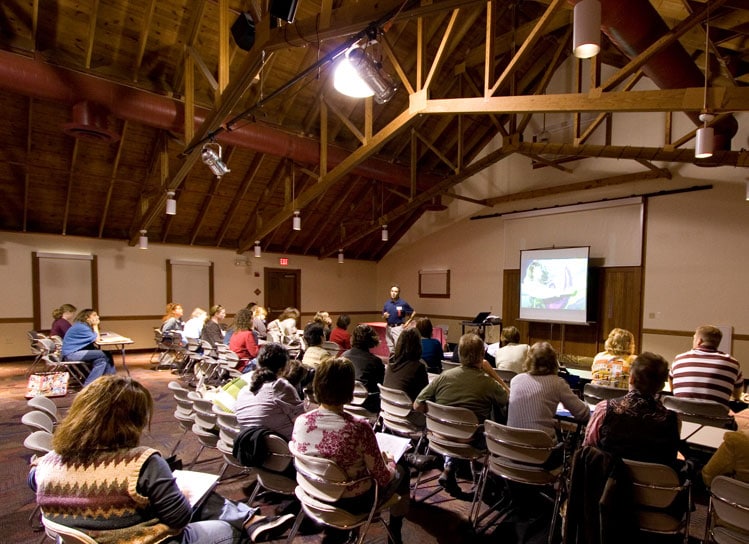
A workshop is a shorter, smaller educational training-type event that is designed to enhance the skills of attendees from a particular industry or area of interest. Workshops are especially popular in industries where rapidly advancing technology or techniques force professionals to learn new skills or risk being made redundant.
The key difference between a workshop and other corporate events like conferences is the hands-on element. Workshops give attendees the chance to practice their skills or learn new ones under the guidance and supervision of an expert. Workshops may involve group discussions, exercises, activities, and the practical applications of concepts learned. You might say workshops are about “doing” rather than “listening” or “networking.”
It’s important to remember that larger events like major conferences may also include workshops in their programming. For example, attendees might have the option of participating in a merchandising workshop during a retail industry conference.
Here are some conceptual examples of what a workshop might look like for various industries and interests:
- Social Media Marketing Workshop for professionals in the marketing industry looking to stay on the cutting edge of digital marketing solutions and best practices.
- Starting a Small Business Workshop for individuals interested in starting their own business who would like to learn more about initial steps and walk away with an outline of a business plan.
- Painting Light & Shadow in Watercolor , a workshop for both hobbyist and professional watercolor painters to hone their skills in a particular area of painting.
Other Types of Conference Events and Meetings

A seminar is an academic event, usually organized by a university, college or other academic institution or professional organization, that focuses on education and discussion around a certain topic. They are often recurring, with a small group of attendees returning for each session. Attendees are expected to actively participate in the seminar by engaging in conversation on the event’s topic, led by an academic who directs the discussion.
Here are some conceptual examples of seminar types and who they may benefit:
- Diversity & Inclusion in Business Seminar for business owners, managers, etc. who are interested in developing their understanding of diversity and inclusion best practices in the workplace.
- Retirement Planning Seminar for individuals interested in taking an active role in planning their own retirement. Discussions may center on participants’ unique situations and the various financial options, or the seminar may have more workshop-style elements where participants create a plan to take home.
- Monthly Seminar for Young Feminists may attract attendees who identify as young feminists and who are interested in learning about of-the-moment feminist topics and engaging in spirited discussion.
How Long Do Seminars Last?
Unlike conferences and even workshops, seminars are quite short. They usually last only a few hours, with any very brief presentations or instructions scheduled for the beginning of the seminar followed by the discussion portion.
Seminar vs Conference: Key Differences
The key differences between seminars and conferences come down to size, duration and programming:
- Size: A seminar usually has a very small group of attendees, while conferences can range in size from small to very large.
- Duration: Seminars typically last no more than a single day, while conferences can range in duration from one to many days.
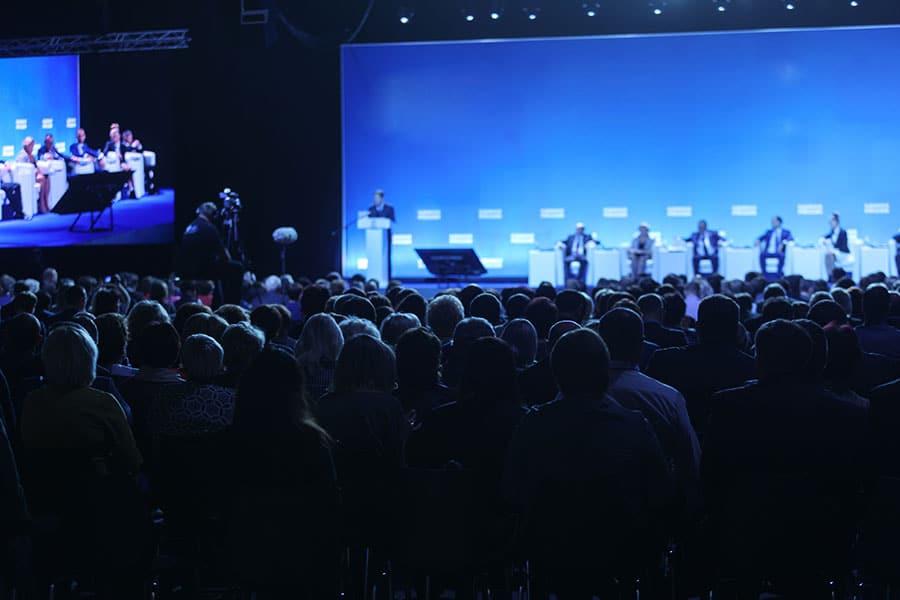
Think of a symposium like a conference, but smaller. Symposiums gather a number of experts in a particular field or area of interest to discuss a topic. The word “symposium” may sometimes be used to describe an academic conference or even a university course that has an open discussion format.
Host your Next Corporate Event at the Heritage Center of Brooklyn Center
Whether you’re planning an intimate seminar or a massive conference, Heritage Center’s staff are the experts you need to make your next corporate event extraordinary! We’ve hosted every kind of corporate event under the sun, so you can trust that our planners are experienced and knowledgeable. No matter the size or duration of your event, the Heritage Center of Brooklyn Center will make the perfect backdrop! Contact us today to learn more about planning your corporate event at our historic venue.
Recent Posts
- How to Plan a Workshop and Create a Workshop Agenda
- 14 Sustainable Wedding Ideas To Have An Eco-Friendly Wedding
- How To Write A Sponsorship Letter For An Event Plus Examples
- Wedding Vendors List: Who You Should Hire For A Wedding
- How To Plan An Outdoor Wedding For Any Weather Occasion
View by Category
Contact us today.
Workshopology
...how to create and deliver an effective workshop.
Wednesday, January 16, 2013
What's the difference between a presentation and a workshop, no comments:, post a comment.
Note: Only a member of this blog may post a comment.
Skip navigation

World Leaders in Research-Based User Experience
UX Workshops vs. Meetings: What's the Difference?

February 16, 2020 2020-02-16
- Email article
- Share on LinkedIn
- Share on Twitter
In This Article:
Misused workshops are a waste of time, purpose and scope, structure and format, planning and preparation, define ux workshops vs. meetings specifically for your team.
Have you ever attended a workshop that was a complete waste of time? Maybe the goal wasn’t clear, the activities seemed meaningless, or it just didn’t feel like anything was getting accomplished. Or, have you ever been asked to facilitate a workshop you felt was unnecessary? Perhaps you felt like you were arbitrarily filling in the hours as you structured the agenda.
These situations happen at organizations where the definitions and appropriate uses of meetings and workshops are unclear. In the past, I’ve seen well-meaning colleagues set up workshops as a way to get face to face with stakeholders, assuming that magic will happen if we simply gather everyone together in the same room for a long period of time. That’s simply not true! If there’s no predefined problem to solve, no real need for collaboration, or no adequate advance planning, workshops are just a waste of time. (And higher-level stakeholders will spurn your next invitation.)
Understanding the differences between workshops and meetings can save everybody’s time, make the most of group collaboration, and avoid creating a bad reputation for workshops.
This article compares distinguishing characteristics for workshops and meetings, including purpose, scope, structure, and the amount of preparation required for each.
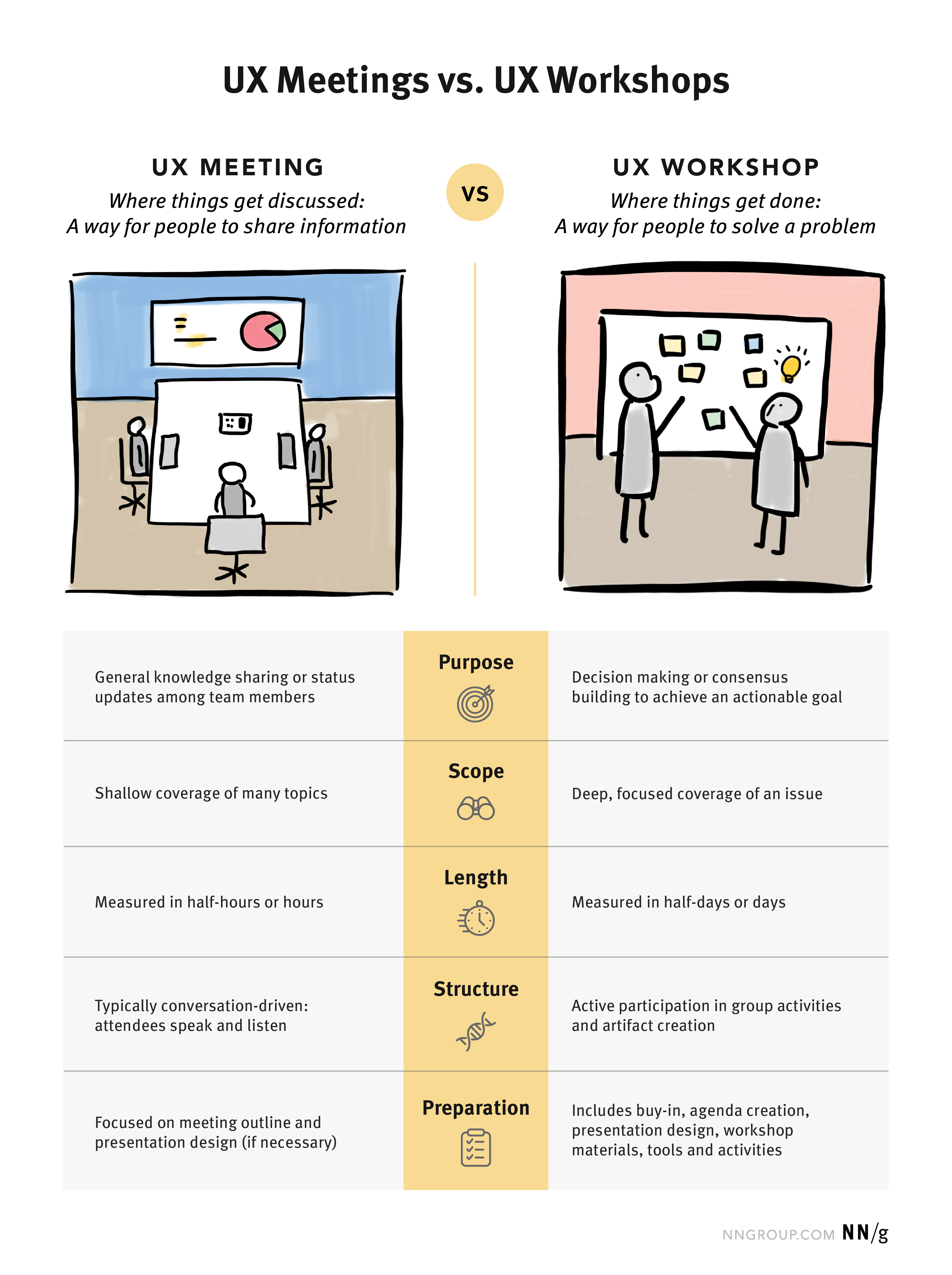
Meetings are a way for people to exchange information. (Think: status updates or general knowledge sharing.) In comparison, workshops are for solving problems, with a concentrated time dedicated to idea generation and hands-on activities that allow groups to achieve an actionable, predefined goal. Simply put, meetings are where things get discussed. Workshops are where things get done.
Because of this difference, meetings are best for shallow coverage of many topics, while workshops are best for deep, focused coverage of an issue.
When Should I Have a Meeting?
Meeting-appropriate scenarios are those where the intention of the attendees is to create a dedicated time to disburse and receive information. These discussions could cover several topics, and decisions or action items don’t necessarily have to be defined or acted upon during the same gathering. Common situations where meetings are appropriate include:
- Project kickoff: An initial gathering of team members who are converging to work on a project together, where key information such as project briefs and roles are discussed
- Standup: A quick (typically 15-minutes) daily, literal standup of a crossfunctional team to share updates on progress and obstacles across workstreams
- Retrospective : A regularly occurring discussion where teams reflect on how they work together and consider ways to improve their processes
- One-on-one: Dedicated time for leads or managers to meet with a direct report to discuss projects, personal growth , and development opportunities
- Leadership sync : Crossfunctional leads over several subteams gathering to discuss progress, learnings, and outstanding action items
- UX/design-team meeting: UX or design team members coming together to share work, knowledge and sources of inspiration
- Design review: Design team members presenting progress and receiving feedback on a design
When Should I Have a Workshop?
Situations that require input and consensus from diverse groups or that would benefit from a sense of shared ownership are appropriate for a collaborative, hands-on workshop format. We’ve previously written about 5 common scenarios for UX workshops , including:
- Discovery workshops: Team members and key knowledge holders converge to understand the current state and build consensus for milestones and plans for an upcoming project.
- Empathy workshops: Designers, researchers and other stakeholders create a shared understanding of user needs before designing a solution.
- Design workshops: Crossdisciplinary team members gather to rapidly generate and discuss a wide set of ideas from various perspectives.
- Prioritization workshops: Team members and other key decision makers come together to decide which items are most important and prioritize them.
- Critique workshops : Roles integral to the design process collaborate to analyze and improve a design so that it meets its objectives.
Each of the above scenarios benefits from a workshop setting, because people don’t simply need to exchange information about a variety of topics; they need to focus deeply on information regarding a specific topic, and act upon or make a plan or decision with that information, as well.
Because the foundational purposes for workshops and meetings differ, it makes sense that the structure of each should also differ. Often, meetings are more passive than workshops — attendees spend most of the time speaking or listening — while workshops encourage active participation in activities such as sketching , brainstorming , or artifact creation to organize and capture group progress. However, hands-on activities certainly do not need to be reserved only for workshops; in meetings they can help participants stay engaged, break out of routine ways of thinking, or encourage reserved personalities to contribute to the conversation.
Workshops Have a Typical Structure
Workshops often go through a series of diverge-and-converge sequences. During diverge activities, team members produce many ideas or generate a large number of contributions relevant to the topic at hand. Workshop facilitators can make use of many types of activities to accomplish this goal, including timed cycles of sketching , brainstorming on sticky notes, or silent idea generation through brainwriting.
Divergent activities are followed by convergent activities, where groups identify and make sense of the patterns and themes within the generated ideas and inputs, and then work to prioritize ideas that are most feasible or have the highest potential for them. Methods such as affinity diagramming and forced ranking are appropriate during this stage.
Meetings Have Structure, Too
Even though workshops tend to follow a more formalized structure than meetings, meetings are not structureless (even though some of us may feel differently from having attended poorly designed meetings in the past).
Even routinely occurring meetings such as standup and one-on-one meetings benefit from structure. One effective approach to introduce a structure flexible enough to accommodate changing discussion items over time is to provide a short list of open-ended questions to contributors before the meeting.
For example, traditional daily standups use a series of questions to ensure that dialogue stays on track. Participants might limit contributions by answering only:
- What did you accomplish yesterday?
- What are you working on today?
- What obstacles are in your way?
In another example, a manager might ask a direct report to prepare an agenda for recurring one-on-one meetings, structured within the framework of a set of questions such as these:
- How’s your happiness?
- Where do you need support?
- What’s exciting for you, or what aspirations do you have right now?
- Do you have any feedback for me?
Even open-ended frameworks like these provide a structure that helps meeting attendees understand the purpose of the meeting, prepare to make the best use of the time allotted, and guide the discussion.
Planning a meeting certainly requires preparation: there may be presentation slides to create, an agenda or meeting outline to draft, and, for nonroutine meetings, you may even have to do a little campaigning so that invitees will show up.
But the preparation required for most meetings pales in comparison to the preparation and planning required for workshops. Workshops are longer in duration and have increased complexities such as hands-on activities that need to be planned and run through, tangible materials and tools to gather, and additional buy-in to build with workshop supporters and attendees about the purpose of the workshop and the importance of their attendance.
One of the most time-consuming preparation activities for workshops, as compared with meetings, is designing the workshop and capturing the structure in a formalized, detailed agenda.
When creating a workshop agenda , begin with a clear goal and work backwards to develop your sequence of activities, rather than jumping straight into listing out all the methods you want to incorporate. Consider first filling out a workshop brief such as the one below to capture the workshop objective, key questions you need to answer, ideal attendees and environment, and your definition of success.
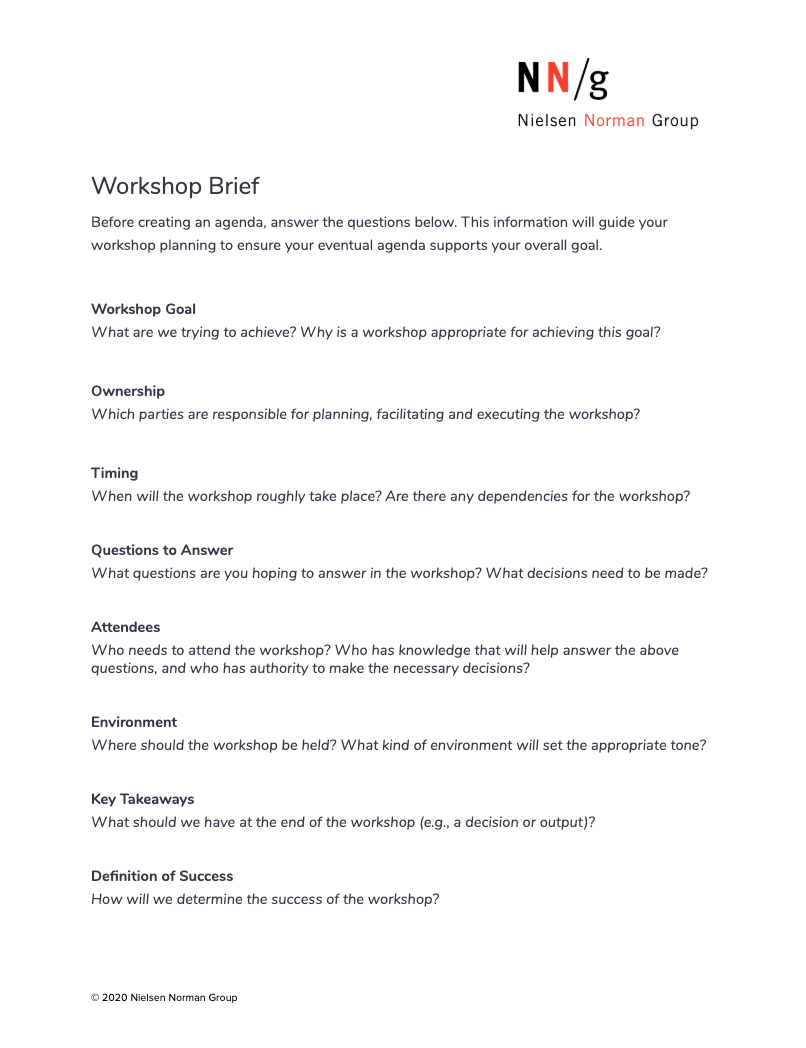
The following checklists for meeting and workshop preparation aren’t comprehensive, but they provide a sense of the differences in required preparation for each gathering. Use them as a starting place when considering how much preparation and planning time will be required for your next workshop and whether you can realistically plan and deliver a useful workshop within your timeline.
Checklist: Preparing for Meetings vs. Workshops
It’s a useful activity to sit down with relevant team members and explicitly define the differences between meetings and workshops for your own group or organization.
Consider gathering to discuss, agree upon and document the differences between meetings and workshops as defined by factors such as:
- Purpose and scope
- Typical session length
- Internal cost to produce
- Cost to clients (if working at an agency, consultancy, or as a freelancer)
- Materials required
- Roles required
- Preparation required
- Post-session activities required
You’ll help your team develop a shared language and a shared understanding that prevents people from flippantly suggesting or calling for workshops without fully understanding the level of commitment and thoughtful planning that effective workshops require.
Free Downloads
Related courses, designops: scaling ux design and research.
Define, share, and implement design operations
Storytelling to Present UX Work
Persuade and engage while presenting research findings and design ideas
Interaction
Successful Stakeholder Relationships
Get buy-in, manage expectations, and build trust
Related Topics
- Design Process Design Process
Learn More:
Please accept marketing cookies to view the embedded video. https://www.youtube.com/watch?v=4fmA4IMeA4U

Make Dot Voting Better
Kate Kaplan · 3 min

Dot Voting: 3 Common Problems
Kate Kaplan · 4 min

Dot Voting: How Many Dots?
Related Articles:
Foundational UX Workshop Activities
Sarah Gibbons · 10 min
Parking Lots in UX Meetings and Workshops
Sarah Gibbons · 5 min
The Diverge-and-Converge Technique for UX Workshops
Therese Fessenden · 6 min
5 UX Workshops and When to Use Them: A Cheat Sheet
Kate Kaplan · 8 min
Dot Voting: A Simple Decision-Making and Prioritizing Technique in UX
Tools for Remote UX Workshops
Stack Exchange Network
Stack Exchange network consists of 183 Q&A communities including Stack Overflow , the largest, most trusted online community for developers to learn, share their knowledge, and build their careers.
Q&A for work
Connect and share knowledge within a single location that is structured and easy to search.
Oral vs Poster vs Workshop. Which is the most prestigious in the context of Computer Vision and Artificial Intelligence?
This question is mainly about the perceived prestige of various events at conferences. Is there a hierarchy to it? Asking this in the perspective of being the presenter. Another way of putting it would be is "10 oral papers on my resume better" or "3 oral, 3 posters, 3 workshops, 1 tutorial on my resume better".
A detailed post regarding which is the most prestigious and why would be appreciated.
Example conferences:
- Computer Vision and Pattern Recognition (CVPR)
- International Conference on Learning Representations (ICLR)
- Association of the Advancement of Artificial Intelligence (AAAI)
- International Conference on Machine Learning (ICML)
- computer-science
- presentation
2 Answers 2
0. Invited/plenary talk at the main conference
1. Paper in the main proceedings with an oral presentation
2. Paper in the main proceedings with a poster presentation
3. Everything else
Having a paper in the primary conference proceedings is more prestigious than not having a paper in the primary conference proceedings. If I understand how CVPR, ICML, and the like work, that means (oral presentations and posters) are more prestigious than (workshop, tutorial, or other).
Only a small number of CVPR/ICML/etc papers are accepted for oral presentation, so having a paper with an oral presentation is more prestigious than having a paper with a poster presentation.
Workshops and tutorials are apples and oranges. A workshop presentation is more likely to be associated with your own original research (if only in preliminary form). On the other hand, a tutorial presentation is a significant community service, and being invited to give a tutorial is a mark of community standing. I would rank tutorials slightly ahead of workshop papers, but I'm sure not everyone would agree with me.
- 1 Actually, as of 2022 all accepted main track papers in ICML are oral. Some are "spotlight", which is like a short-oral in other conferences. – Amit Portnoy Commented May 24, 2022 at 9:18
I am going to give you a partial answer, waiting for a more complete explanation of your question. The highest prestige is in giving an opening or closing speech at a plenary session in a big conference. Then the same kind of talk at a secondary conference. Then a oral presentation at a parallel session in big confernence in your field, followed by oral/parallel/small. Poster in my opinion comes after all of this. Not sure what you mean by workshop, and tutorial. If you are the one leading the workshop, giving the tutorial, it's a big thing. If you are just attending, then it counts as training yourself, not educating others.
You must log in to answer this question.
Not the answer you're looking for browse other questions tagged conference computer-science presentation poster workshop ..
- Featured on Meta
- Bringing clarity to status tag usage on meta sites
- We've made changes to our Terms of Service & Privacy Policy - July 2024
- Announcing a change to the data-dump process
Hot Network Questions
- Making wobbly 6x4’ table stable
- How to handle stealth before combat starts?
- Why isn't openvpn picking up my new .conf file?
- Why can't wrong-owner intention refer to a communal bull?
- What's wrong with my app authentication scheme?
- Why does the definition of a braided monoidal category not mention the braid equation?
- What is the meaning of "Exit, pursued by a bear"?
- Density matrices and locality
- Garage door not closing when sunlight is bright
- DIN Rail Logic Gate
- Is my encryption format secure?
- Where exactly was this picture taken?
- 90/180 day rule with student resident permit, how strict it is applied
- Function to find the most common numeric ordered pairings (value, count)
- Dial “M” for murder
- What is the purpose of toroidal magnetic field in tokamak fusion device?
- Why is たってよ used in this sentence to denote a request?
- Is a *magnetized* ferrite less ideal as a core?
- Can police offer an “immune interview”?
- Unreachable statement wen upgrading APEX class version
- Is there a law against biohacking your pet?
- Terminal autocomplete (tab) not completing when changing directory up one level (cd ../)
- What is the meaning of these Greek words ἵπποπείρην and ἐπεμβάτην?
- What does it mean to have a truth value of a 'nothing' type instance?
Workshop Seminar Symposium vs Conference: Difference and Comparison
Sharing is caring!
The best way to reach a conclusion, solve a problem, or learn something, is to do it with a group of people.
This way, we can find a number of opinions, ideas and perspectives to go around to find the best possible way to tackle an issue or learn something.
Key Takeaways Workshops are interactive learning sessions where participants engage in hands-on activities or discussions to develop specific skills or knowledge. Seminars are educational events where an expert or group of experts presents information on a specific topic to an audience. Symposiums are gatherings of experts who present and discuss their research or opinions on a particular subject, with audience participation. Conferences are large-scale events where professionals gather to network, share knowledge, and discuss advancements in their field, featuring a variety of presentations, workshops, and panel discussions.
Workshop vs Seminar vs Symposium vs Conference
Symposium is a one-day official gathering of intellectual scholars to talk on a certain topic. A workshop is a special setting to do practicals and learn about a certain issue through questions asked personally by the teachers. Seminars cover a variety of topics and enable the speaker to address a particular audience for a brief period. Conferences are highly official, lasting up to days, and cover international topics.
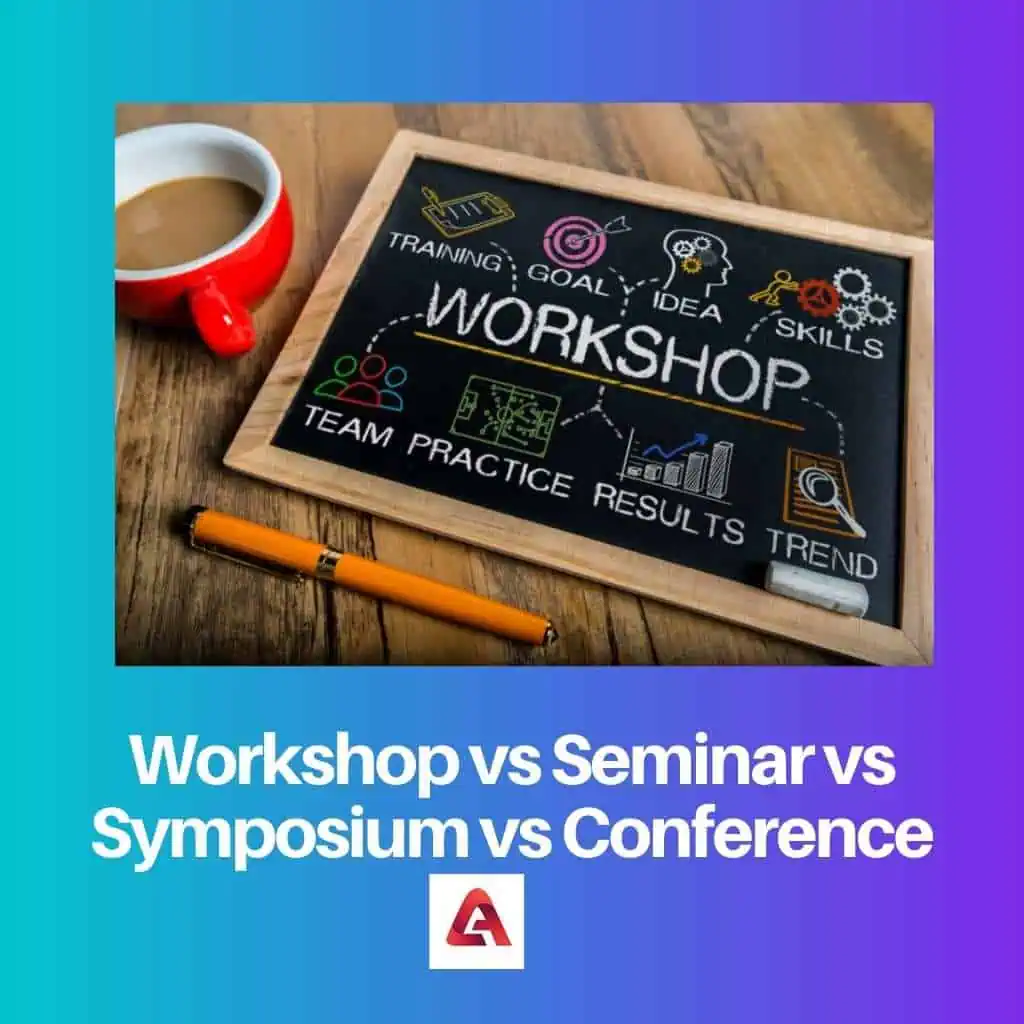
A Workshop is where a certain skill is taught to the attendees practically step-by-step.
Similar Reads
- Conference vs Seminar: Difference and Comparison
- Webinar vs Workshop: Difference and Comparison
- Conference vs Webinar: Difference and Comparison
- Conference vs Journal: Difference and Comparison
- Lecture vs Seminar: Difference and Comparison
A Seminar is where a group of experts teach or spread awareness on a given topic.
A Symposium is where an expert in a certain field discusses the details of a topic in that field.
A conference is a formal discussion where a small group of people discuss a matter and brainstorm ideas on it. It may be to solve a problem or share their ideas on a topic to get to a conclusion.
A conference commonly takes place in offices and between business officials.
Comparison Table
| Definition | Practical lessons taught to the attendees | Academic instructions conducted by an organization | Group of people of a particular field discuss a topic | Group of people with shared interests discuss how to solve a problem. |
| Benefits | Learn a new skill | Gain awareness | Gain knowledge | Be able to solve an issue, find new ideas |
| Type | Informal | Informal | Formal or informal | Formal |
| Mode of conduction | Online or offline | Online or offline | Online or offline | Tends to be offline more than online |
| Area of conduction | Schools, etc | College/Universities, etc | Intellectual events, etc | Offices, businesses. etc |
What is a Workshop?
A workshop is where a person or a group of people share and teach a new skill to those attending and looking forward to learning it.
Workshops are a great way to learn various things, such as making websites and apps or using certain software to gain the required results.
Workshops are most useful in schools, colleges, etc., where students can learn various new things to increase the scope of their career paths.
It is easy to find workshops on any work nowadays, like carpentry, fashion design, web design, photoshop, exercises and workouts, etc.

What is a Seminar?
Seminars are conducted to share knowledge or spread awareness on a subject. Seminars are commonly held in colleges, universities, etc. and are conducted by well-known professional organizations.
Some of the most common seminar subjects include investing, personal finance, real estate and web marketing.
These seminars contain experts who share their opinions and ideas on a subject and share them with the people.
This way, they are able to spread awareness of that subject as well as share their knowledge with the community.

What is a Symposium?
A symposium is where a group of experts together discuss a subject and share their different opinions, ideas, ideology and perspective with each other, and it takes place in front of an audience who are able to learn all about the said subject by default by listening to the expert’s conversation.
Symposiums are a great way to learn about things together with learning about the distinguished opinions and ideals of the experts. Symposiums are informal however, it is an extremely beneficial thing to be a part of.
A symposium doesn’t necessarily have to be educational. It can even be something like a discussion on movies . In a symposium like this, instead of experts, the panel might have actors, directors, or maybe even just well-known fanatics of different genres of movies.
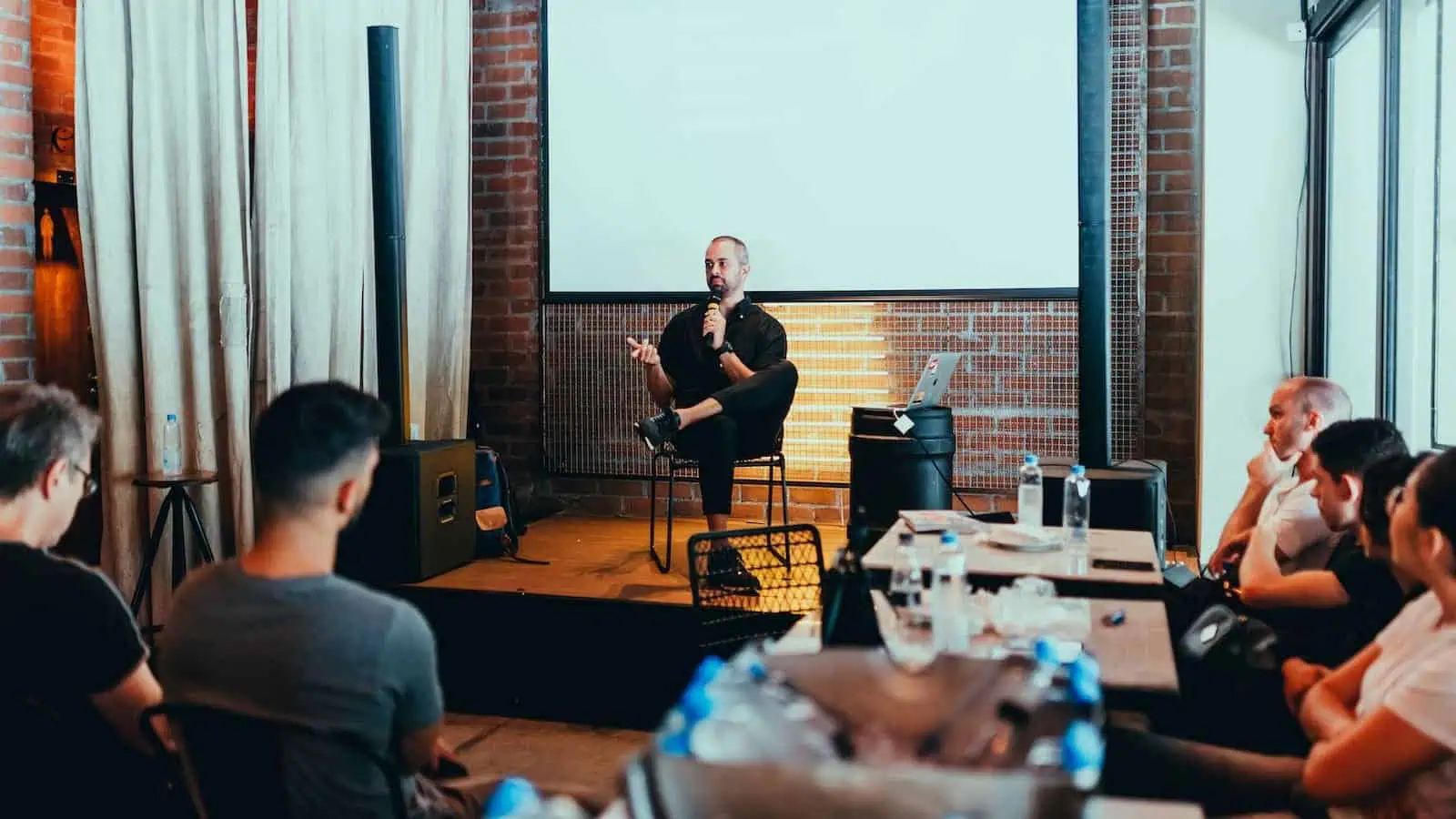
What is a Conference?
A conference is a formal discussion conducted amongst people who share similar interests and are working together towards a goal.
This discussion may include conversations about the different paths that can be taken to reach their goal and share their different perspectives or the various obstacles that may appear on the path to the goal and how to solve them.
These are held in offices, businesses or companies with various executives sitting in a room together, looking to grow their brand or solve an issue they face.

Main Differences Between Workshop, Seminar, Symposium and Conference
- Workshops are a practical learning process, whereas conference is a discussion of a matter of concern.
- Seminars are conducted to spread awareness and a way to share information, unlike conferences which are used to solve an important problem.
- Symposiums have an expert that shares their wisdom and knowledge on a topic with others attending it, whereas a conference doesn’t necessarily have an expert but instead a group of people tackling the same issue from different standpoints.
- Workshops, seminars and symposiums are conducted for an audience, unlike a conference between a select few individuals that are crucial to the matter at hand.
- Workshops, seminars, symposiums and conferences can all be conducted online, however, conferences are conducted for dire matters of utmost importance where it being offline might be better for the productivity of it.
- https://journals.co.za/doi/abs/10.10520/ejc-saradio-v57-n1-a5
- https://www.taylorfrancis.com/books/mono/10.4324/9781315760322/conference-interpreting-explained-roderick-jones
I’ve put so much effort writing this blog post to provide value to you. It’ll be very helpful for me, if you consider sharing it on social media or with your friends/family. SHARING IS ♥️
Want to save this article for later? Click the heart in the bottom right corner to save to your own articles box!
By Chara Yadav
Chara Yadav holds MBA in Finance. Her goal is to simplify finance-related topics. She has worked in finance for about 25 years. She has held multiple finance and banking classes for business schools and communities. Read more at her bio page .
Related Post
Value analysis vs value engineering: difference and comparison, unqualified vs qualified report: difference and comparison, asset vs wealth management: difference and comparison, 5 ways to change your ip address: quick and effective methods, how to recover your old myspace photos: a quick guide, microsoft office 2021 product activation key [free], how to search for a word on a web page: a quick guide for all browsers.
- Open access
- Published: 12 August 2024
Micropapillary breast carcinoma in comparison with invasive duct carcinoma. Does it have an aggressive clinical presentation and an unfavorable prognosis?
- Yasmine Hany Abdel Moamen Elzohery 1 , 5 ,
- Amira H. Radwan 2 , 5 ,
- Sherihan W. Y. Gareer 2 , 5 ,
- Mona M. Mamdouh 3 , 5 ,
- Inas Moaz 4 , 5 ,
- Abdelrahman Mohammad Khalifa 5 ,
- Osama Abdel Mohen 5 ,
- Mohamed Fathy Abdelfattah Abdelrahman Elithy 5 nAff6 &
- Mahmoud Hassaan 5 nAff7
BMC Cancer volume 24 , Article number: 992 ( 2024 ) Cite this article
315 Accesses
Metrics details
Invasive micropapillary carcinoma (IMPC) was first proposed as an entity by Fisher et al. In the 2003 World Health Organization (WHO) guidelines for histologic classification of the breast tumors. IMPC was recognized as a distinct, rare histological subtype of breast cancer.
IMPC is emerging as a surgical and oncological challenge due to its tendency to manifest as a palpable mass, larger in size and higher in grade than IDC with more rate of lymphovascular invasion (LVI) and lymph node (LN) involvement, which changes the surgical and adjuvant management plans to more aggressive, with comparative prognosis still being a point of ongoing debate.
Aim of the study
In this study, we compared the clinicopathological characteristics, survival and surgical management of breast cancer patients having invasive micropapillary carcinoma pathological subtype in comparison to those having invasive duct carcinoma.
This is a comparative study on female patients presented to Baheya center for early detection and treatment of breast cancer, in the period from 2015 to 2022 diagnosed with breast cancer of IMPC subtype in one group compared with another group of invasive duct carcinoma. we analyzed 138 cases of IMPC and 500 cases of IDC.
The incidence of LVI in the IMPC group was 88.3% in comparison to 47.0% in the IDC group (p < 0.001). IMPC had a higher incidence of lymph node involvement than the IDC group (68.8% and 56% respectively). IMPC had a lower rate of breast conserving surgery (26% vs.37.8%) compared with IDC.
The survival analysis indicated that IMPC patients had no significant difference in overall survival compared with IDC patients and no differences were noted in locoregional recurrence rate and distant metastasis rate comparing IMPCs with IDCs.
The results from our PSM analysis suggested that there was no statistically significant difference in prognosis between IMPC and IDC patients after matching them with similar clinical characteristics. However, IMPC was found to be more aggressive, had larger tumor size, greater lymph node metastasis rate and an advanced tumor stage.
Peer Review reports
Introduction
Breast cancer is the most common cancer in women. In the 2012 World Health Organization (WHO) classification of breast cancer. Breast Cancer is classified into up to 21 different histological types depending on cell growth, morphology and architecture patterns [ 1 ]. The invasive carcinoma of no special type (IBC-NST), which is known as invasive ductal carcinoma (IDC), is the most frequently occurring histological type, which constitutes around 75% of invasive breast carcinoma [ 2 ].
Invasive micropapillary carcinoma (IMPC) was first proposed as an entity by Fisher et al. in 1980 [ 3 ] and first described as the term “invasive micropapillary carcinoma” by Siriaunkgul et al. [ 4 ] in 1993.
In the 2003 World Health Organization (WHO) guidelines for histologic classification of the breast tumors [ 5 ]. IMPC was recognized as a distinct, rare histological subtype of breast cancer. While micropapillary histological architecture is present in 2–8% of breast carcinomas, pure micropapillary carcinoma is uncommon and accounts for 0.9–2% of all breast cancers [ 6 ].
IMPC exhibits more distinct morphologic architecture than the IDC, characterized by pseudopapillary and tubuloalveolar arrangements of tumor cell clusters in clear empty sponge-like spaces that resemble extensive lymphatic invasion [ 7 ]. The neoplastic cell exhibits an “inside-out” pattern, known as the reverse polarity pattern [ 2 ].
Most studies demonstrate that the radiological findings of IMPC are irregular-shaped masses with an angular or spiculated margin on ultrasound, mammography and MRI with heterogeneous enhancement and washout kinetics on MRI [ 8 ].
IMPC had tendency to manifest as a palpable mass, larger in size and higher in grade than IDC with more rate of lymphovascular invasion (LVI) and lymph node (LN) involvement, which changes the surgical and adjuvant management plans to more aggressive, with comparative prognosis still being a point of ongoing debate [ 9 ].
In this study, we compared the clinicopathological characteristics, survival and surgical management of breast cancer patients having invasive micropapillary carcinoma pathological subtype in comparison to those having invasive ductal carcinoma.
Patient and method
This is a comparative study on female patients presented to Baheya center for early detection and treatment of breast cancer, in the period from 2015 to 2022 diagnosed with breast cancer of IMPC subtype in one group compared with another group of invasive duct carcinoma.
This retrospective study analyzed 138 cases of IMPC and 500 cases of IDC. Informed consent was obtained from all patients. Ethical approval is obtained from Baheya center for early detection and treatment of breast cancer and National research center ethics committee. Baheya IRB protocol number:202305150022.
The following clinical-pathological features were analyzed for each case: patient age at diagnosis, clinical presentation, laterality, imaging findings, histopathological examination, treatment plan with either primary surgical intervention or other treatment protocol according to tumor stage and biological subtypes.
A breast pathologist evaluated the tumor size, type, grade, lymphovascular invasion, estrogen receptor (ER), progesterone receptor (PR), human epidermal growth factor receptor 2 (HER2) receptor and the axillary lymph node involvement.
According to the ASCO/CAP guideline update, 2019: Samples with 1% to 100% of tumor nuclei positive for ER or progesterone receptor (PgR) are interpreted as positive. If ER (not PgR), 1% to 10% of tumor cell nuclei are immunoreactive, the sample are reported as ER Low Positive. There are limited data on the overall benefit of endocrine therapies for patients with low level (1%-10%) ER expression, but they currently suggest possible benefit, so patients are considered eligible for endocrine treatment. A sample is considered negative for ER or PgR if < 1% or 0% of tumor cell nuclei are immunoreactive [ 10 ]. An Allred score between 0 and 8. This scoring system looks at what percentage of cells test positive for hormone receptors, along with how well the receptors show up after staining, called intensity: proportion of cells staining (0, no staining; 1, < 1%; 2, between 1 and 10%; 3, between 11 and 33%; 4, between 34 and 66% and 5, between 67%–100% of the cells staining). Intensity of positive tumor cells (0, none; 1, weak, 2, intermediate; and 3, strong) [ 11 ].
HER2 Test Guideline IHC Recommendations, 2018. IHC 0: as defined by no staining observed or membrane staining that is incomplete and is faint/barely perceptible and within < = 10% of the invasive tumor cells. IHC 1 + : as defined by incomplete membrane staining that is faint/barely perceptible and within > 10% of the invasive tumor cells. IHC 2 + : The revised definition of IHC 2 + (equivocal) is weak to moderate complete membrane staining observed in > 10% of tumor cells. IHC 3 + : based on circumferential membrane staining that is complete, intense in > 10% of tumor cells. [ 12 ].
ASCO–CAP HER2 SISH Test Guideline Recommendations,2018 Twenty nuclei (each containing red (Chr17) and black (HER2) signals) should be enumerated. The final results for the HER2 status are reported based on the ratio formed by dividing the sum of HER2 signals for all 20 nuclei divided by the sum of Chromosome 17 signals for all 20 nuclei. The amplification status is defined as Amplified if the HER2/Chromosome 17 ratio > / = 2.0 and the average Her2 gene copy number is > / = 4.0. It is non-Amplified if the HER2/Chromosome 17 ratio < 2.0 with the Her2 gene copy number is < 4.0. If the HER2/Chr17 ratio is < 2 and the Her2 gene copy number is between 4.0 and 6.0, or, HER2/Chr17 ratio is > / = 2 and the Her2 gene copy number is < 4, or HER2/Chr17 ratio is < 2 and the Her2 gene copy number is > / = 6.0, an additional work should be done. [ 12 ].
Follow-up duration was calculated from the date of diagnosis to the date of the last follow-up. Patients still alive at the last follow-up censored or to the date of occurrence of any event or death.
Disease-free survival was defined as the duration (months) from the initial diagnosis of breast cancer to first any type of recurrence (invasive ipsilateral breast tumor recurrence, local invasive recurrence, regional invasive recurrence, invasive contra lateral breast cancer, distant metastasis.
Overall survival (OS) is defined as the time from diagnosis of breast cancer to death from any cause.
Data were statistically analyzed using an IBM-compatible personal computer with Statistical Package for the Social Sciences (SPSS) version 23. Quantitative data were expressed as mean, standard deviation (SD) and range (minimum–maximum). Qualitative data were expressed as Number (N) and percentage (%), while A P value of < 0.05 was statistically significant. For comparison of unmatched data, chi-square tests were used for categorical variables and t-tests or Mann–Whitney tests for continuous variables.
In this study, we analyzed 138 cases of IMPC which presented to our center in the period from 2015 to 2022.We included a total number of 500 cases of IDC as controls with a ratio of controls to cases 4:1.
Propensity score matching (PSM) is a method for filtrating experimental and control cases of similar characteristics, which are called the matching variables, from existing data to make them comparable in a retrospective analysis. PSM reduce the effect of selection bias. So, the comparison of outcomes between two groups can be fair.
The variables for propensity score matching were selected as follows: age (years), tumour size (cm), nodal status, HR status and HER2 status.
To diminish the effects of baseline differences and potential confounds in clinical characteristics and patients across histology subtypes for outcome differences (disease-free survival and overall survival), PSM method was applied with each micropapillary patient matched to one IDC patient who showed similar baseline characteristics in terms of: menopausal status, comorbidities, multiplicity, histologic grade, tumor size, stage, nodal status, ER /PR status. Differences in prognosis were assessed by Kaplan–Meier analysis.
Most of the patients were postmenopausal, the mean age of patients in IMPC group was 57.36 ± 11.321 years while the mean age of the IDC group was 56.63 ± 9.719 years ( p = 0.45) (Table 1 ).
The most common presentation of IMPC on breast mammography was an irregular shaped mass with a non-circumscribed spiculated margin. while, the most common sonographic finding of IMPC was hypoechoic mass with irregular shapes and spiculated margins. Associated microcalcifications were found in 49 patients (35.5%) of IMPC group. Figs. ( 1 , 2 ): Radiological characteristics of IMPC.

A , B 37-years-old female patient presented with Left breast UOQ extensive fine pleomorphic and amorphous calcifications of segmental distribution, with UOQ multiple indistinct irregular masses. C ultrasound showed left breast UOQ multiple irregular hypoechoic masses with calcific echogenic foci, the largest is seen at 1 o’clock measuring 13 × 15mm. Intraductal echogenic lesions are noted
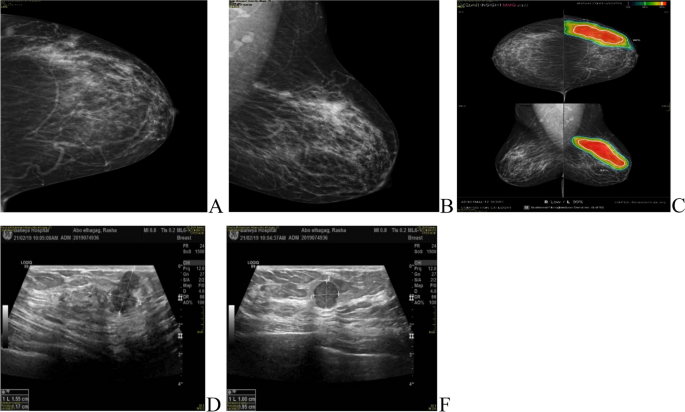
A , B , C 40-years-old female patient presented with left UOQ extensive pleomorphic microcalcifications of segmental distribution reaching the areola, with multiple well-circumscribed small obscured masses. D , E complementary Ultrasound showed left 2 o’clock multiple ill-defined and well-defined hypoechoic masses (BIRADS 5)
All patients underwent axillary sonography where 77 patients (55.8%) of the IMPC group exhibited pathological lymph nodes and 18 patients (13%) had indeterminate lymph nodes demonstrating preserved hila and associated with either a symmetrical increase of their cortical thickness reaching 3mm or with a focal increase in the cortical thickness.
Multiple lesions were detected in 30% of IMPC patients in comparison to 7% of IDC patients. Intra-ductal extension with nipple involvement was found in 44 patients (31.9%) of the IMPC group (Table 2 ).
MRI was done for 5 cases (3.6%), while CESM was performed for 18 cases (13%) of the IMPC group, the commonest presentation of IMPC in contrast study was irregular shaped enhanced mass in 21 patients and non-mass enhancement was found in 5 patients. Figs. ( 3 , 4 ).
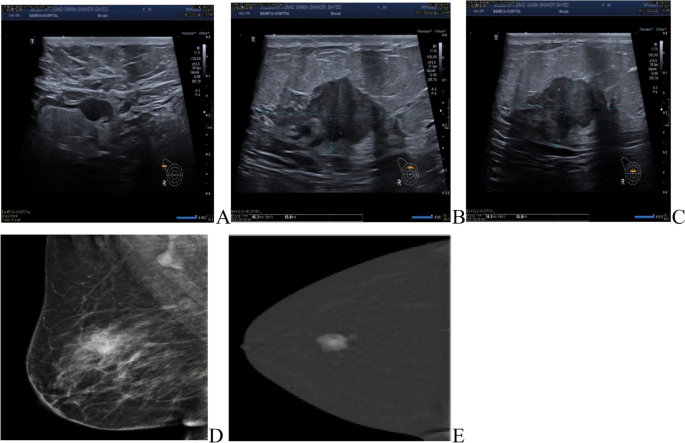
Further imaging modalities. A , B , C 60-years-old female patient had right breast irregular hypoechoic solid mass by ultrasound (BIRADS 5). D , E CESM showed a right breast irregular heterogeneously enhancing solid mass

Role of CESM in diagnosis of IMPC patients. A , B 42-years-old patient presented with a left LIQ irregular spiculated mass with suspicious microcalcifications, other similar lesions were seen anterior and posterior at the same line. C Ultrasound showed a heterogeneously hypoechoic irregular mass with a spiculated outline with multiple similar satellite lesions were seen anterior and posterior to the main lesions
The average tumor size in the IMPC and IDC groups was 3.37 ± 2.04 cm and 2.72 ± 1.39 cm, respectively ( P < 0.001).
The percentage of tumors larger than 5cm, was reported 9.5% in IMPC and 7.4% in IDC.
The pure form of IMPC was the most common type and found in 90 cases (65%) and 47 cases (34%) were mixed type where IDC was the commonest associated type.
There are 6 cases in the IMPC group diagnosed as invasive mucinous carcinoma on biopsy, then in the specimen was mixed invasive micropapillary, IBC-NST and invasive mucinous carcinoma.
On core biopsy, 28 cases were diagnosed as IMPC with focal IDC component, but in corresponding specimens 10 cases were only approved to be mixed invasive micropapillary and invasive duct carcinoma, while others diagnosed as pure invasive micropapillary carcinoma without IDC component.
On the other hand, 48 of our cases were diagnosed as IDC on core biopsy, but in the final specimen examination, 17 of these cases were diagnosed as pure invasive micropapillary carcinoma without invasive ductal component.
The explanation of controversy in proper histologic subtyping of carcinoma on core biopsy and the definite subtype on the corresponding specimen was that the ductal component which only represented in the biopsy is a very minor component of the tumor or the limited sampling, tissue fragmentation and architecture distortion in core biopsy may cause diagnostic pitfalls as regard precise subtyping of the tumor.
The incidence of LVI in the IMPC group was 88.3% in comparison to 47.0% in the IDC group ( p < 0.001).
IMPC had a higher incidence of lymph node involvement than the IDC group (68.8% and 56% respectively) with N3 stage reported in 12.4% of IMPC patients.
IMPC had a higher nuclear grade than the IDC group (25.1% and 15.2% respectively).
The percentage of ER-positive patients was 97.8% in the IMPC group and 87.6% in the IDC group ( p < 0.001), while PR-positive cases were 98.6% in the IMPC group and 88.8% in the IDC group ( p < 0.001). HER2 status was positive in 4.3% of IMPCs and 8% of IDCs ( p = 0.23) (Table 3 ) (Figs. 5 , 6 ).

A case of invasive micropapillary carcinoma. A case of invasive micropapillary carcinoma, grade II. A Tissue core biopsy, × 100, B MRM specimen × 100 with Positive metastatic L. nodes 2/15, C ER is positive in > 90% of tumor cells, × 100, D PR is positive in > 90% of tumor cells, × 400, E HER2/neu is negative, × 400 and F) Ki-67 labelling index is high, × 200. This case was considered as luminal type pure invasive micropapillary carcinoma. (100 micron 20__ 50 micron 40)

A case of invasive duct carcinoma. A case of invasive duct carcinoma, grade II. A Tissue core biopsy, × 100, B MRM specimen, × 200 with negative L. nodes 0/16, C ER is positive in > 90% of tumor cells, × 200, D PR is positive in > 90% of tumor cells, × 100, E HER2/neu is negative, × 400. This case was considered as luminal type pure invasive duct carcinoma
Regarding definitive surgical management, IMPC had a lower rate of breast conserving surgery (26% vs.37.8%) compared with IDC. While, 49.3% of IMPC patients underwent modified radical mastectomy in comparison to 46% of the IDC patients. Such high incidence of mastectomy was due to the advanced stage at presentation, presence of multiple lesions and presence of intra-ductal extension with nipple involvement.
The incidence of re-surgery in the IMPC group was only in 3 cases, two of them underwent completion mastectomy after the initial conservative breast surgery and axillary clearance. While one patient underwent wider margin excision as positive margin for an invasive residual disease was found.
Two patients in the IMPC group had distant metastasis at the initial diagnosis, they had multiple metastatic lesions and received systemic treatment but one of them underwent palliative mastectomy.
Systemic chemotherapy was administered to 107 patients (77.5%) in the IMPC group and to 207 patients (41%) in the IDC group. Hormonal therapy was administered to all IMPC patients and 76% patients in the IDC group (Table 4 ).
The overall median follow-up duration was 21 months (range 6 – 88 months) with mean follow up duration = 29.8months.
Among the 138 IMPC patients, local recurrence developed in 3 cases, they developed a recurrence at 6,18 and 48 months postoperative. Distant metastasis developed in 5 patients in the form of bone, lung, hepatic and mediastinal lymph node metastasis.
The survival analysis indicated that IMPC patients had no significant difference in overall survival compared with IDC patients and no differences were noted in locoregional recurrence rate comparing IMPCs with IDCs (2.2% and 0.4% respectively). P value for local recurrence = 0.12 (yates corrected chi square).
Distant metastasis rate comparing IMPCs with IDCs was (3.7% and 5.4% respectively). P value for distant metastasis = 0.53 (Table 5 ).
Comparison of OS between IDC and micropapillary cases (Matched by propensity score matching -PSM).
Case Processing Summary
Type | Total N | N of Events | Censored | |
|---|---|---|---|---|
N | Percent | |||
IDC | 125 | 7 | 118 | 94.4% |
Micropapillary | 128 | 3 | 125 | 97.7% |
Overall | 253 | 10 | 243 | 96.0% |
Type | Mean survival time | |||
|---|---|---|---|---|
Estimate | Std. Error | 95% Confidence Interval | ||
Lower Bound | Upper Bound | |||
IDC | 84.596 | 2.314 | 80.061 | 89.131 |
Micropapillary | 57.530 | .844 | 55.876 | 59.185 |
Overall | 85.807 | 1.633 | 82.606 | 89.008 |
Overall Comparisons
Chi-Square | df | Sig. | |
|---|---|---|---|
Log Rank (Mantel-Cox) | .438 | 1 | .508 |
- Test of equality of survival distributions for the different levels type
Disease free survival
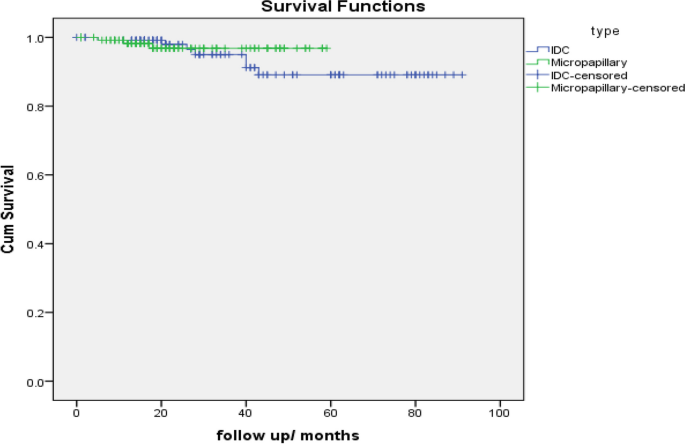
Type | Total N | N of Events | Censored | |
|---|---|---|---|---|
N | Percent | |||
IDC | 124 | 11 | 113 | 91.1% |
Micropapillary | 129 | 5 | 124 | 96.1% |
Overall | 253 | 16 | 237 | 93.7% |
Type | Mean | |||
|---|---|---|---|---|
Estimate | Std. Error | 95% Confidence Interval | ||
Lower Bound | Upper Bound | |||
IDC | 77.324 | 3.019 | 71.407 | 83.242 |
Micropapillary | 56.062 | 1.355 | 53.407 | 58.718 |
Overall | 78.725 | 2.333 | 74.152 | 83.299 |
Chi-Square | df | Sig. | |
|---|---|---|---|
Log Rank (Mantel-Cox) | .380 | 1 | .537 |
- Test of equality of survival distributions for the different levels of type
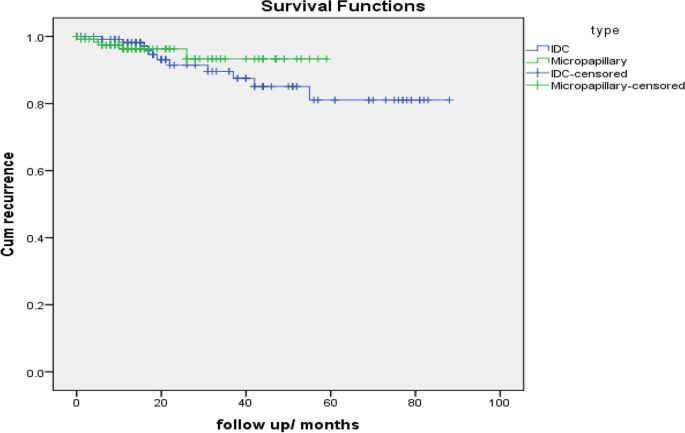
IMPC is a highly invasive type of breast cancer. Hashmi A.A. et al. [ 13 ] found that the incidence of IMPC is very low accounting for 0.76–3.8% of breast carcinomas.
Shi WB et al.; [ 7 ] in a study comparing 188 IMPC cases and 1,289 invasive ductal carcinoma (IDC) cases from China showed that IMPC can occur either alone or mixed with other histological types, such as ductal carcinoma in situ, mucinous carcinoma and IDC. Furthermore, the majority of patients had mixed IMPC.
Fakhry et al. [ 14 ] reported that 64.7% of IMPC patients were pure type. In our study, we found that the pure form of IMPC was the commonest type and presented in 90 patients (65%) and 47 cases (34%) were mixed type which was similar to that reported by Nassar et al. [ 15 ], and Guo et al. [ 16 ] in their studies.
In our study, the commonest finding of IMPC on breast mammography was an irregular shaped mass with a non-circumscribed spiculated margin. While, the commonest sonographic finding of IMPC was hypoechoic mass with irregular shapes and spiculated margins.
These findings were similar to the results demonstrated by Jones et al., [ 17 ] which found that the commonest morphologic finding of IMPC was an irregular high-density lesion (50% of patients) with spiculated margin (42% of patients). However, Günhan-Bilgen et al. [ 18 ] reported that an ovoid or round lesion was found in 53.8% of patients.
Alsharif et al., [ 19 ] reported that the commonest sonographic finding of IMPC was hypoechoic masse (39/41, 95%) with irregular shape (30/41, 73.2%) and angular or spiculated margin (26/41, 63.4%).
In our study, MRI was done for 5 cases (3.6%), while CESM was performed for 18 cases (13%) of the IMPC group, the commonest presentation of IMPC in contrast study was irregular shaped enhanced lesion in 21 cases and non-mass enhancement was presented in 5 cases.
Nangogn et al. [ 20 ] and yoon et al. [ 8 ] recorded that the commonest finding of IMPCs in MRI was spiculated irregular mass with early rapid initial heterogenous enhancement, indicating that the MRI findings correlated with the invasiveness of IMPC.
Fakhry et al. [ 14 ] conducted a study on 68 cases, out of which 17 cases underwent CEM. In all of these cases, the masses showed pathological enhancement, which was either in the form of mass enhancement (12/17 patients, 70.6%) or non-mass enhancement (4/17 patients, 23.5%). The majority of the enhanced masses were irregular in shape (11/12 patients, 91.7%).
All patients underwent axillary sonography and 77 patients (55.8%) of the IMPC group exhibited pathological lymph nodes; this percentage was similar to that recorded by Nangong et al. [ 20 ] which was 54.8% and lower than that recorded by Jones et al. [ 17 ] but higher than that of Günhan et al. [ 18 ] which were 67% and 38% respectively.
Günhan et al. [ 18 ] reported microcalcification in about 66.7% of the cases. In our study, associated microcalcifications were found in 49 patients (35.5%) of the IMPC group. Yun et al. [ 21 ] and Adrada et al. [ 22 ] showed a fine pleomorphic appearance (66.7% and 68%).
Hao et al. [ 23 ] compared the rate of tumors larger than 5cm, reporting 3% in IDC and 4.3% in IMPC. In our study, the rate of tumors larger than 5cm, was reported 7.4% in the IDC patients and 9.5% in the IMPC patients.
Yu et al., et al. [ 24 ] documented in a study comparing 72 cases of IMPC and 144 cases of IDC of the breast that IMPC had a higher nuclear grade than IDC (52.8% vs. 37.5% respectively). In our study, IMPC had a higher nuclear grade than the IDC group (25.1% and 15.2% respectively).
Verras GI et al.; [ 9 ] demonstrated that IMPC was an aggressive breast cancer subtype with a great tendency to lymphovascular invasion and lymph node metastasis. In our study, the incidence of LVI in the IMPC patients was 88.3% in comparison to 47.0% in the IDC patients ( p < 0.001). Tang et al., [ 25 ] also reported that lymphovascular involvement was more common among the IIMPC group than IDC group, with a percentage of 14.7% compared to only 0.1% in the IDC group.
Also, Shi et al. [ 7 ] reported that LVI was detected in 74.5% of cases. Furthermore, the frequency of LVI was found to be greater in IMPC cases when compared to IDC cases. Jones et al., [ 17 ] recorded angiolymphatic invasion in 69% of cases.
Hashmi et al. [ 13 ] reported in his comparative study that nodal involvement was present in 49.5% of IDC patients and N3 stage was only 15.6% in IDC patients compared to 33% in IMPC patients. In our study, the percentage of lymph node involvement of IMPC and IDC patients were 68.8% and 56% respectively with N3 stage reported in 12.4% of IMPC patients.
Guan et al. [ 26 ], Lewis et al., [ 27 ], Pettinato et al., [ 28 ] and De La Cruz et al., [ 29 ] recorded a higher percentage of lymph node metastasis in IMPC patients, reaching 90%, 92.9%,55.2% and 60.9% respectively.
The management of IMPC remains controversial, particularly among breast surgeons. Modified radical mastectomy was the preferred surgical procedure for the majority of IMPC case reports, as found in a study conducted by Yu et al., [ 24 ] where 99% of IMPC cases underwent modified radical mastectomy. Fakhry et al. [ 14 ] reported that 76.5% of the patients underwent modified radical mastectomy. In our study, 49.3% of IMPC patients received modified radical mastectomy.
IMPC patients were also prone to accept BCS rather than mastectomy in the previous series conducted by Lewis GD,et al. [ 27 ] and Vingiani, A. et al. [ 30 ]. However, the precise prognosis value of BCS for patients with IMPC remained unknowable. In our study, IMPC had a lower rate of breast conserving surgery (26% vs.37.8%) compared with IDC.
IMPC was characterized by a high incidence of ER and PR positivity. Our study recorded a high percentage of ER (97.8%) and PR (98.6%) expression. Our findings are similar to those found by Walsh et al., [ 31 ] who reported ER and PR expression of 90% and 70%, respectively. Zekioglu et al. [ 32 ] demonstrated a rate of ER and PR expression of 68% and 61%respectively.
In this study, we reported a relatively lower percentage of HER-2 positivity (4.3%). Also, Nangong et al. [ 20 ] showed HER 2 overexpression in 26.4% of cases.
However, Cui et al. [ 33 ] reported a much higher incidence of HER 2 positivity and Perron et al., [ 34 ] reported that 65% of IMPCs were HER-2 positive.
Chen, A et al. [ 35 ] reported that that the percentage of radiation therapy for IMPC patients was similar to those seen in IDC patients and demonstrates a similar benefit of radiation treatment in both groups. In our study,77.5% patients received radiotherapy in IMPC group in compared to 59.4% patients in IDC group.
Shi et al. [ 7 ] found that patients with IMPC had worse recurrence-free survival (RFS) and overall survival (OS) rates as compared to those with IDC. However, because IMPC is relatively rare, most studies had reported on small sample sizes with limited follow-ups.
Yu et al., [ 24 ] conducted a comparison between IMPC and IDC patients, and the results showed that the IMPC group had a greater tendency for LRR compared to the IDC group ( P = 0.03), but the distant metastasis rate ( P = 0.52) and OS rate ( P = 0.67) of the IMPC showed no statistical differences from the IDC group.
Nevertheless, several recent studies documented that IMPC had better or similar prognosis in comparison to IDC.
Hao et al. [ 23 ] and Vingiani et al. [ 30 ] documented that there was no statistically significant difference in OS and disease-free survival between IMPC patients and IDC patients which was similar to our results. locoregional recurrence rate comparing IMPCs with IDCs was (2.2% and 0.4% respectively). P value for local recurrence = 0.12 (yates corrected chi square). Distant metastasis rate comparing IMPCs with IDCs was (3.7% and 5.4% respectively). P value for distant metastasis = 0.53.
Chen H et al. [ 36 ], compared the overall survival in patient groups with similar nodal involvement and found that IMPC group had better breast cancer–specific survival and overall survival than IDC group.
Availability of data and materials
No datasets were generated or analysed during the current study.
Abbreviations
Invasive micropapillary carcinoma
Invasive duct carcinoma
Modified radical mastectomy
Conserving breast surgery
Estrogen receptor
Progesterone receptor
Lymphovascular invasion
Contrast enhanced spectral mammography
Overall survival
Lakhani SR. International Agency for Research on Cancer Press and World Health Organization. WHO Classification of Tumours of the Breast. Lyon: International Agency for Research on Cancer Press; 2012.
Wu Y, Zhang N, Yang Q. The prognosis of invasive micropapillary carcinoma compared with invasive ductal carcinoma in the breast: a meta-analysis. BMC Cancer. 2017;17:839.
Article PubMed PubMed Central Google Scholar
Fisher ER, Palekar AS, et al. Pathologic findings from the national surgical adjuvant breast project (protocol no. 4). Vi. Invasive papillary cancer. Am J Clin Pathol. 1980;73:313–22.
Article PubMed CAS Google Scholar
Siriaunkgul S, Tavassoli FA. Invasive micropapillary carcinoma of the breast. Mod Pathol. 1993;6:660–2.
PubMed CAS Google Scholar
Hanby AM, walker C, Tavassoli FA, Devilee P. Pathology and Genetics: Tumours of the Breast and Female Genital Organs. WHO Classification of Tumours series. Breast Cancer Res. Lyon: IARC Press; 2004;4(6):133. https://doi.org/10.1186/bcr788 .
Yang YL, Liu BB, Zhang X, Fu L. Invasive micropapillary carcinoma of the breast: an update. Arch Pathol Lab Med. 2016;140(8):799–805. https://doi.org/10.5858/arpa.2016-0040-RA .
Shi WB, Yang LJ, et al. Clinico-pathological features and prognosis of invasive micropapillary carcinoma compared to invasive ductal carcinoma: a population-based study from china. PLoS ONE. 2014;9:e101390.
Yoon GY, Cha JH, Kim HH, Shin HJ, Chae EY, Choi WJ. Comparison of invasive micropapillary and invasive ductal carcinoma of the breast: a matched cohort study. Acta Radiol. 2019;60(11):1405–13.
Article PubMed Google Scholar
Verras GI, et al. Micropapillary breast carcinoma: from molecular pathogenesis to prognosis. Breast Cancer (Dove Med Press). 2022;12(14):41–61.
Google Scholar
Allison KH, Hammond MEH, Dowsett M, McKernin SE, Carey LA, Fitzgibbons PL, et al. Estrogen and Progesterone Receptor Testing in Breast Cancer: ASCO/CAP Guideline Update. J Clin Oncol. 2020;38(12):1346–66. https://doi.org/10.1200/JCO.19.02309 .
Fitzgibbons PL, Dillon DA, Alsabeh R, Berman MA, Hayes DF, Hicks DG, Hughes KS, Nofech-Mozes S. Template for reporting results of biomarker testing of specimens from patients with carcinoma of the breast. Arch Pathol Lab Med. 2014;138(5):595–601.
Ahn S, Woo JW, Lee K, Park SY. HER2 status in breast cancer: changes in guidelines and complicating factors for interpretation. J PatholTransl Med. 2020;54(1):34.
Hashmi AA, et al. Clinicopathologic features of invasive metaplastic and micropapillary breast carcinoma: comparison with invasive ductal carcinoma of breast. BMC Res Notes. 2018;11:1–7.
Article Google Scholar
Fakhry S, et al. Radiological characteristics of invasive micropapillary carcinoma of the breast. Clin Radiol. 2024;79(1):e34–40.
Nassar H, Wallis T, Andea A, et al. Clinicopathologic analysis of invasive micropapillary differentiation in breast carcinoma. Mod Pathol. 2001;14:836e41.
Guo X, Chen L, Lang R, et al. Invasive micropapillary carcinoma of the breast: association of pathologic features with lymph node metastasis. Am J Clin Pathol. 2006;126:740e6.
Jones KN, Guimaraes LS, Reynolds CA, Ghosh K, Degnim AC, Glazebrook KN. Invasive micropapillary carcinoma of the breast: imaging features with clinical and pathologic correlation. AJR Am J Roentgenol. 2013;200:689–95.
Günhan-Bilgen I, et al. Invasive micropapillary carcinoma of the breast: clinical, mammographic, and sonographic findings with histopathologic correlation. AJR Am J Roentgenol. 2002;179:927–31.
Alsharif S, et al. Mammographic, sonographic and MR imaging features of invasive micropapillary breast cancer. Eur J Radiol. 2014;83(8):1375–80.
Nangong J, Cheng Z, Yu L, Zheng X, Ding G. Invasive micropapillary breast carcinoma: a retrospective study on the clinical imaging features and pathologic findings. Front Surg. 2022;23(9):1011773.
Yun SU, Choi BB, Shu KS, et al. Imaging findings of invasive micropapillary carcinoma of the breast. J Breast Cancer. 2012;15:57e64.
Adrada B, Arribas E, Gilcrease M, et al. Invasive micropapillary carcinoma of the breast: mammographic, sonographic, and MRI features. AJR Am J Roentgenol. 2009;193:58e63.
Hao S, Zhao Y, Peng J, et al. Invasive micropapillary carcinoma of the breast had no difference in prognosis compared with invasive ductal carcinoma: a propensity-matched analysis. Sci Rep. 2019;9:1–8.
Yu JI, Choi DH, Huh SJ, et al. Differences in prognostic factors and failure patterns between invasive micropapillary carcinoma and carcinoma with micropapillary component versus invasive ductal carcinoma of the breast: retrospective multicenter case-control study (KROG 13–06). Clin Breast Cancer. 2015;15:353–361.e2.
Tang S-L, Yang J-Q, Du Z-G, et al. Clinicopathologic study of invasive micropapillary carcinoma of the breast. Oncotarget. 2017;8:42455–65.
Guan X, Xu G, Shi A, et al. Comparison of clinicopathological characteristics and prognosis among patients with pure invasive ductal carcinoma, invasive ductal carcinoma coexisted with invasive micropapillary carcinoma, and invasive ductal carcinoma coexisted with ductal carcinoma. Medicine (Baltimore). 2020;99:e23487.
Lewis GD, Xing Y, Haque W, et al. The impact of molecular status on survival outcomes for invasive micropapillary carcinoma of the breast. Breast J. 2019;25:1171e6.
Pettinato G, Pambuccian SE, Di Prisco B, et al. Fine needle aspiration cytology of invasive micropapillary (pseudopapillary) carcinoma of the breast: report of 11 cases with clinicopathologic findings. Acta Cytol. 2002;46:1088e94.
De La Cruz C, et al. Invasive micropapillary carcinoma of the breast: clinicopathological and immunohistochemical study. Pathol Int. 2004;54:90–6.
Vingiani A, et al. The clinical relevance of micropapillary carcinoma of the breast: a case–control study. Histopathology. 2013;63:217–24.
Walsh MM, Bleiweiss IJ. Invasive micropapillary carcinoma of the breast: eighty cases of an underrecognized entity. Hum Pathol. 2001;32:583–9.
Zekioglu O, et al. Invasive micropapillary carcinoma of the breast: high incidence of lymph node metastasis with extranodal extension and its immunohistochemical profile compared with invasive ductal carcinoma. Histopathology. 2004;44:18–23.
Cui ZQ, et al. Clinicopathological features of invasive micropapillary carcinoma of the breast. Oncol Lett. 2015;9:1163–6.
Perron M, Wen HY, Hanna MG, Brogi E, Ross DS. HER2 Immunohistochemistry in invasive micropapillary breast carcinoma: complete assessment of an incomplete pattern. Arch Pathol Lab Med. 2021;145:979–87.
Article PubMed PubMed Central CAS Google Scholar
Chen A, Paulino A, Schwartz M, et al. Population-based comparison of prognostic factors in invasive micropapillary and invasive ductal carcinoma of the breast. Br J Cancer. 2014;111:619–22.
Chen H, Wu K, Wang M, Wang F, Zhang M, Zhang P. Invasive micropapillary carcinoma of the breast has a better long-term survival than invasive ductal carcinoma of the breast in spite of its aggressive clinical presentations: a comparison based on large population database and case–control analysis. Cancer Med. 2017;6:2775–86.
Download references
Acknowledgements
Not applicable.
Open access funding provided by The Science, Technology & Innovation Funding Authority (STDF) in cooperation with The Egyptian Knowledge Bank (EKB).
Author information
Mohamed Fathy Abdelfattah Abdelrahman Elithy
Present address: Department of Surgical Oncology, Faculty of Medicine, Al Azhar University, Cairo, Egypt
Mahmoud Hassaan
Present address: Departement of Surgical Oncology, National Cancer Institute, Cairo University, Giza, Egypt
Authors and Affiliations
Department of General Surgery, Faculty of Medicine, Ain Shams University, Cairo, Egypt
Yasmine Hany Abdel Moamen Elzohery
Department of Radiodiagnosis, NCI, Cairo University, Giza, Egypt
Amira H. Radwan & Sherihan W. Y. Gareer
Department of Pathology, National Cancer Institute, Cairo University, Giza, Egypt
Mona M. Mamdouh
Department of Epidemiology and Preventive Medicine, National Liver Institute, Menoufia, Egypt
Baheya Center for Early Detection and Treatment of Breast Cancer, Giza, Egypt
Yasmine Hany Abdel Moamen Elzohery, Amira H. Radwan, Sherihan W. Y. Gareer, Mona M. Mamdouh, Inas Moaz, Abdelrahman Mohammad Khalifa, Osama Abdel Mohen, Mohamed Fathy Abdelfattah Abdelrahman Elithy & Mahmoud Hassaan
You can also search for this author in PubMed Google Scholar
Contributions
Mohamed fathy participated in the sequence alignment and Yasmine hany drafted the manuscript. Mahmoud Hassan participated in the design of the study. Inas Moaz and Abdelrahman Mohammad performed the statistical analysis. Amira H. Radwan and Sherihan WY Gareer conceived the study. Mona M Mamdouh and Osama abdel Mohen participated in its design and coordination and helped to draft the manuscript. All authors read and approved the final manuscript.
Corresponding author
Correspondence to Yasmine Hany Abdel Moamen Elzohery .
Ethics declarations
Ethics approval and consent to participate.
Available all patients provided informed consent for publication. All patients provided signed written informed consent.
Consent for publication
Ethical approval is obtained from Baheya center for early detection and treatment of breast cancer and National research center ethics committee. Baheya IRB protocol number: 202305150022.
Competing interests
The authors declare no competing interests.
Additional information
Publisher’s note.
Springer Nature remains neutral with regard to jurisdictional claims in published maps and institutional affiliations.
Rights and permissions
Open Access This article is licensed under a Creative Commons Attribution 4.0 International License, which permits use, sharing, adaptation, distribution and reproduction in any medium or format, as long as you give appropriate credit to the original author(s) and the source, provide a link to the Creative Commons licence, and indicate if changes were made. The images or other third party material in this article are included in the article's Creative Commons licence, unless indicated otherwise in a credit line to the material. If material is not included in the article's Creative Commons licence and your intended use is not permitted by statutory regulation or exceeds the permitted use, you will need to obtain permission directly from the copyright holder. To view a copy of this licence, visit http://creativecommons.org/licenses/by/4.0/ . The Creative Commons Public Domain Dedication waiver ( http://creativecommons.org/publicdomain/zero/1.0/ ) applies to the data made available in this article, unless otherwise stated in a credit line to the data.
Reprints and permissions
About this article
Cite this article.
Elzohery, Y.H.A.M., Radwan, A.H., Gareer, S.W.Y. et al. Micropapillary breast carcinoma in comparison with invasive duct carcinoma. Does it have an aggressive clinical presentation and an unfavorable prognosis?. BMC Cancer 24 , 992 (2024). https://doi.org/10.1186/s12885-024-12673-0
Download citation
Received : 05 April 2024
Accepted : 23 July 2024
Published : 12 August 2024
DOI : https://doi.org/10.1186/s12885-024-12673-0
Share this article
Anyone you share the following link with will be able to read this content:
Sorry, a shareable link is not currently available for this article.
Provided by the Springer Nature SharedIt content-sharing initiative
ISSN: 1471-2407
- Submission enquiries: [email protected]
- General enquiries: [email protected]

IMAGES
COMMENTS
Conference vs seminar vs workshop- they may be different from one another, but each of them provide ample learning opportunities. Read on to know more about them.
The details behind hosting a big event can change based on the type of gathering. Learn the differences between seminar vs workshop & when to use each one.
What is the difference between Seminar vs Workshop? Find out the definition of seminar and workshop, including the key differences between.
Discover the key differences between seminar vs workshops in our detailed guide. Unlock the insights you need—read now!
What is the difference between a workshop and meeting? What distinguishes workshops from meetings, seminars and training courses is an emphasis on active participation, experiential learning and collaborative work. You could begin to think of a workshop as an interactive meeting, but they go much further than that.
The difference between a workshop and a conference is that workshops are generally smaller than conferences, and are usually only a day or two long and are dedicated to discussing a specific topic.
You may call your content "presentations," but depending on who you ask, someone else may call it a keynote speech, a breakout session, a program, a seminar, a workshop…the list goes on. To ensure that you're delivering a talk that's right for the audience and event, you have to know the differences between a keynote and a workshop.
In sum, the primary difference between a workshop and a seminar lies in their focus and format. Seminars are generally more formal, with an emphasis on the delivery of content or information, while workshops are typically more interactive, with a focus on skill development. Choosing between a seminar or workshop largely depends on the goals and ...
A seminar typically involves an expert-led presentation to share knowledge, whereas a workshop emphasizes hands-on learning and practical activities.
If you're asked to attend a seminar or workshop for your job or business, you'll want to know the following: What's a seminar? What's a workshop? Know the differences between the two. Generally, a workshop is interactive but a seminar is similar to a lecture.
Let's call them talks and workshops, and even though in both cases the subject will be Stan, the audience's expectations will be different and my presentation must reflect those differences. In particular, Scott's book is a lot more relevant to talks than workshops. Most inexperiences speakers assume that the people who come to their ...
The difference between a seminar and a workshop lies in their format, purpose, and level of interaction, with seminars being more formal and lecture-based while workshops involve hands-on activities and group discussions. Learn the difference here.
Facilitating a workshop and running a seminar or training have many things in common. However, they are NOT THE SAME. So, what's the difference between a wor...
Difference between seminar and workshop. The key difference is that seminars are typically led by one or two experts on the subject, while workshops are often led by facilitators who guide participants through the material. This can make seminars more passive in nature, while workshops are more interactive. Seminars tend to be more academic in ...
A workshop is a long interactive meeting or educational session designed to create a specialized result. Workshops are longer than the typical business meeting and require more preparation beforehand. Workshops typically involve a central trainer or facilitator who works with a set of sponsors to design the sequence of presentations, plan ...
As nouns the difference between workshop and presentation. is that workshop is a room, especially one which is not particularly large, used for manufacturing or other light industrial work while presentation is the act of presenting, or something presented.
Key Differences. Seminar: Primarily aims to inform, educate, or discuss topics with participants. Workshop: Focuses on active learning and skill development through practical exercises. Seminar: Typically features lectures, presentations, and Q&A sessions. Workshop: Involves interactive activities, group work, and hands-on tasks.
A conference theme will usually be broader than the topic of a workshop, which tends to focus on a more specific and hands-on topic. Conferences tend to be longer events than shorter workshops and seminars. They can last several days or more and may have anywhere from 50 attendees to thousands of attendees. If the conference is large enough ...
Sometimes, a workshop is just a conference, but the organizers decided to call it a workshop instead for one reason or another. So while a lot of people will have some idea of what the difference should be, in practice the difference can be non-existent, so one will need to look at the details of each individual conference or workshop to decide ...
Presentations and workshops are often very similar. They key difference is that the audience usually does something during a WORKshop. During a presentation, the presenter does all the work. Posted by Joel Heffner at 6:30 PM.
This article compares distinguishing characteristics for workshops and meetings, including purpose, scope, structure, and the amount of preparation required for each. UX Workshops vs. Meetings: Meetings are for people to share information. Workshops are for solving a problem. Purpose, scope, length, structure, and preparation differ for each.
A workshop presentation is more likely to be associated with your own original research (if only in preliminary form). On the other hand, a tutorial presentation is a significant community service, and being invited to give a tutorial is a mark of community standing.
Workshop, seminar, symposium, and conference are all types of events or gatherings, but they differ in terms of their size, format, and focus, with workshops being more interactive and hands-on, seminars focusing on a specific topic with expert speakers, symposiums involving multiple presentations or discussions on a particular subject, and ...
We identified significant differences in clinical presentation between the two age groups in both cohorts, including histopathological types, histopathological grade, stage, and sarcomatoid differentiation. However, there were substantial differences observed between the two age groups in the Nanjing cohort, which were not observed in the TCGA ...
Background Invasive micropapillary carcinoma (IMPC) was first proposed as an entity by Fisher et al. In the 2003 World Health Organization (WHO) guidelines for histologic classification of the breast tumors. IMPC was recognized as a distinct, rare histological subtype of breast cancer. IMPC is emerging as a surgical and oncological challenge due to its tendency to manifest as a palpable mass ...